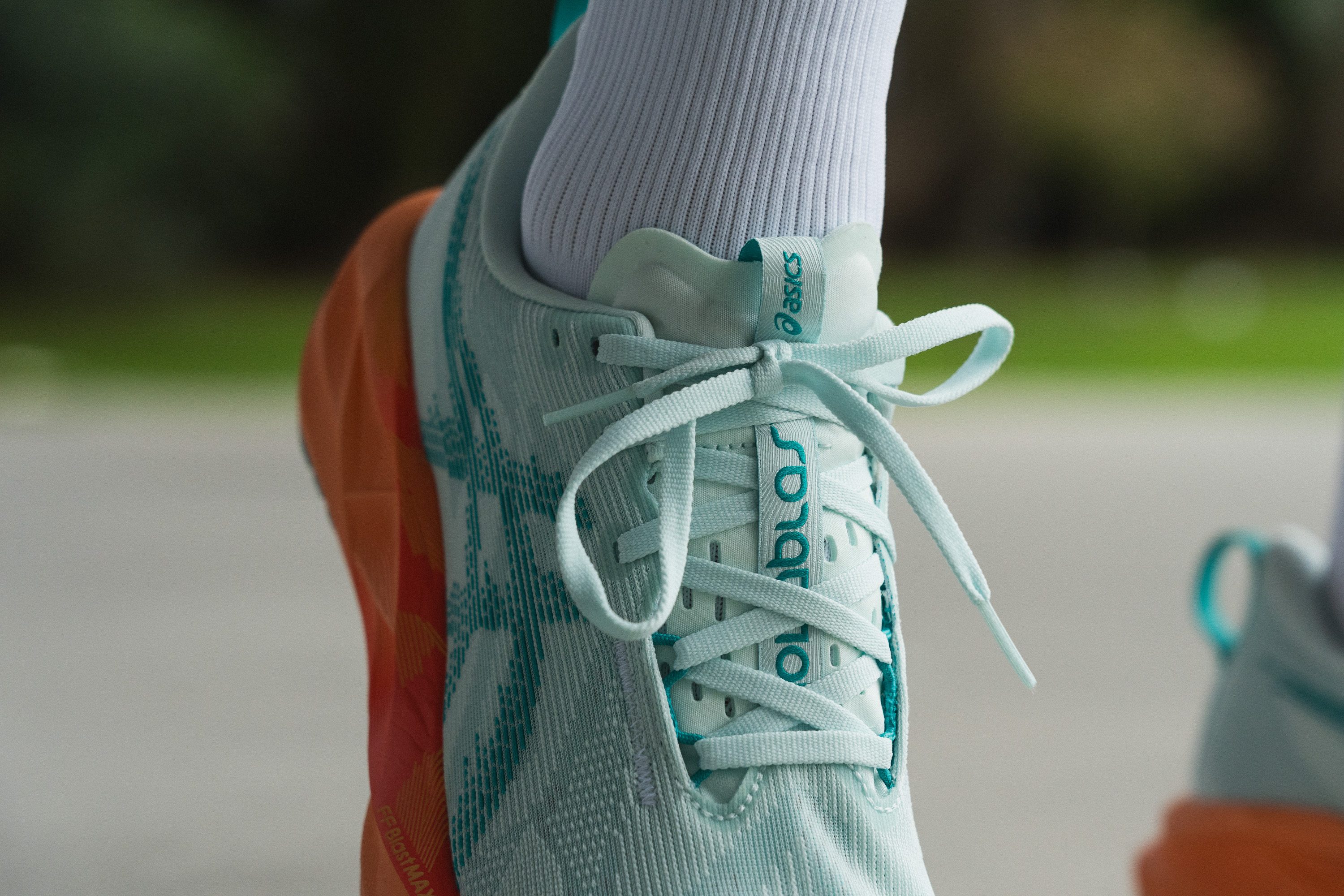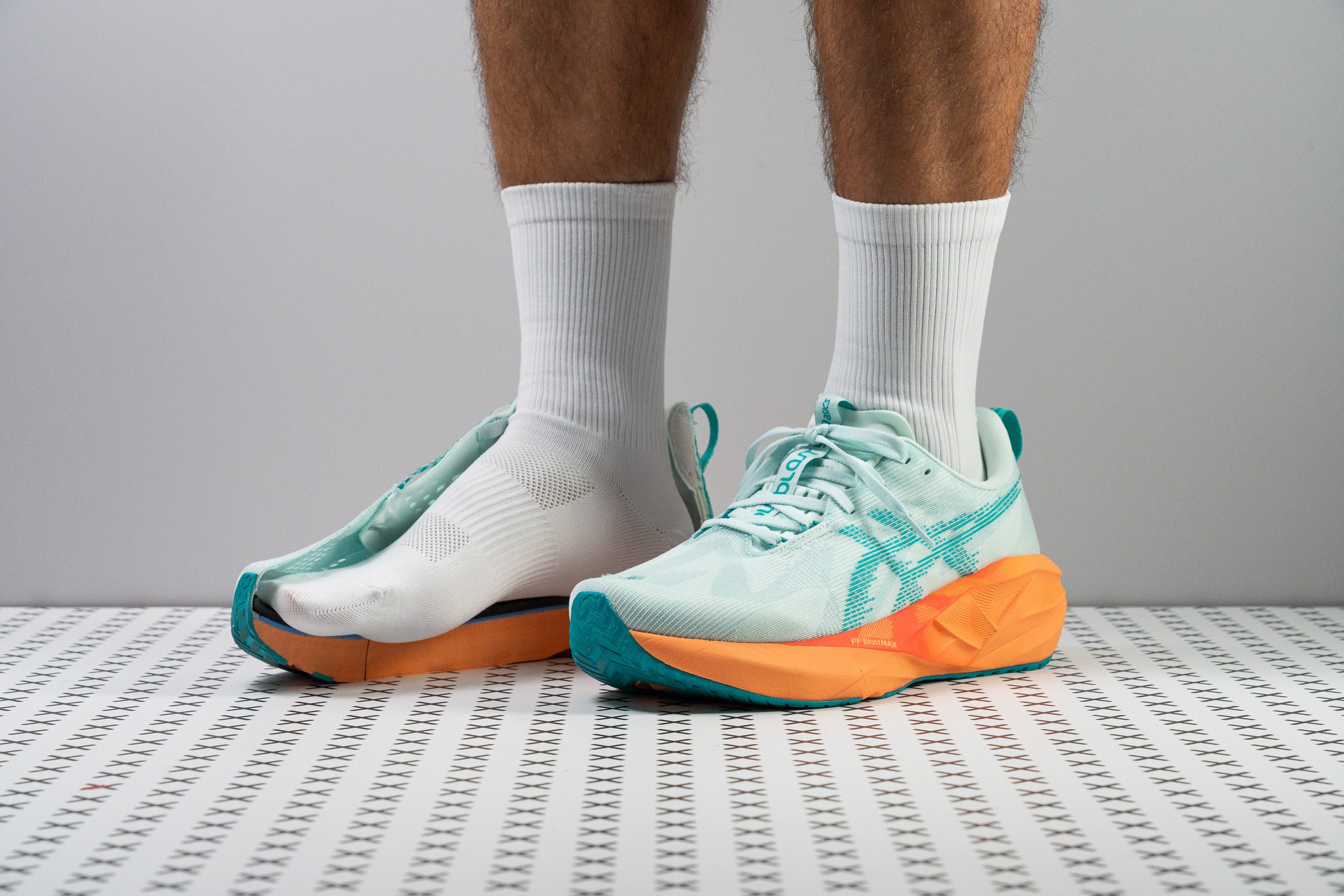Our verdict
- Top pick in best running shoes
- Top pick in best long distance running shoes
Pros
- Improved energy return with FF Blast MAX foam
- Plushiest foam in a Novablast yet
- Keeps the same price as v4
- Higher stack height for extra cushioning
- Enhanced flexibility
- Lighter than its predecessor
- Best Novablast ever for wide feet
- Exceptional weight-to-cushion balance
- Works for short, medium and long runs
Cons
- Breathability could be improved
- Toebox durability
Audience verdict
- Top 6% in road running shoes
- Top 11% in ASICS running shoes
- Top 2% most popular running shoes
Comparison
The most similar running shoes compared
+ + Add a shoe | |||||
|---|---|---|---|---|---|
| Audience score | 92 Superb! | 89 Great! | 89 Great! | 87 Great! | |
| Price | $150 | $200 | $130 | $180 | |
| Pace | Daily runningTempo | Daily running | Daily running | Tempo | |
| Shock absorption | High | High | Moderate | - | |
| Energy return | Moderate | Low | Moderate | - | |
| Traction | High | - | Moderate | - | |
| Arch support | Neutral | Neutral | Neutral | Neutral | |
| Weight lab Weight brand | 9 oz / 254g 9 oz / 255g | 10.8 oz / 305g 10.9 oz / 309g | 10.1 oz / 285g 9.8 oz / 277g | 8.7 oz / 247g 9.1 oz / 259g | |
| Lightweight | ✗ | ✗ | ✗ | ✓ | |
| Drop lab Drop brand | 7.4 mm 8.0 mm | 6.6 mm 6.0 mm | 7.0 mm 6.0 mm | 7.7 mm 8.0 mm | |
| Strike pattern | Mid/forefoot | Mid/forefoot | HeelMid/forefoot | Mid/forefoot | |
| Size | True to size | True to size | True to size | Slightly large | |
| Midsole softness | Soft | Soft | Balanced | Balanced | |
| Difference in midsole softness in cold | Big | Small | Normal | Normal | |
| Toebox durability | Bad | Decent | Decent | Decent | |
| Heel padding durability | Decent | Good | Decent | Decent | |
| Outsole durability | Good | Decent | Bad | Bad | |
| Breathability | Moderate | Breathable | Moderate | Moderate | |
| Width / fit | Medium | Medium | Medium | Medium | |
| Toebox width | Medium | Medium | Medium | Medium | |
| Stiffness | Moderate | Stiff | Moderate | Stiff | |
| Torsional rigidity | Stiff | Stiff | Moderate | Stiff | |
| Heel counter stiffness | Moderate | Moderate | Moderate | Stiff | |
| Rocker | ✓ | ✓ | ✓ | ✓ | |
| Heel lab Heel brand | 40.9 mm 41.5 mm | 42.3 mm 47.0 mm | 36.8 mm 31.0 mm | 36.4 mm 36.0 mm | |
| Forefoot lab Forefoot brand | 33.5 mm 33.5 mm | 35.7 mm 41.0 mm | 29.8 mm 25.0 mm | 28.7 mm 28.0 mm | |
| Widths available | NormalWide | Normal | Normal | Normal | |
| Orthotic friendly | ✓ | ✓ | ✓ | ✓ | |
| Season | All seasons | SummerAll seasons | All seasons | All seasons | |
| Removable insole | ✓ | ✓ | ✓ | ✓ | |
| Ranking | #19 Top 5% | #105 Top 28% | #89 Top 24% | #170 Top 45% | |
| Popularity | #7 Top 2% | #9 Top 3% | #232 Bottom 39% | #279 Bottom 26% |
Who should buy
After testing the ASICS Novablast 5 in our lab, we’re convinced it’s an outstanding choice for:
- Runners wanting a versatile, cushioned, and comfortable daily trainer at a price below premium-tier options.
- Fans of the Novablast 3 who felt the Novablast 4 as a downgrade. This version reintroduces the jacquard mesh upper and a more dynamic ride.
- A running shoe with maximalist stack height that feels surprisingly lightweight.
- Beginners in need of a single shoe capable of handling casual runs and occasional tempo training sessions.
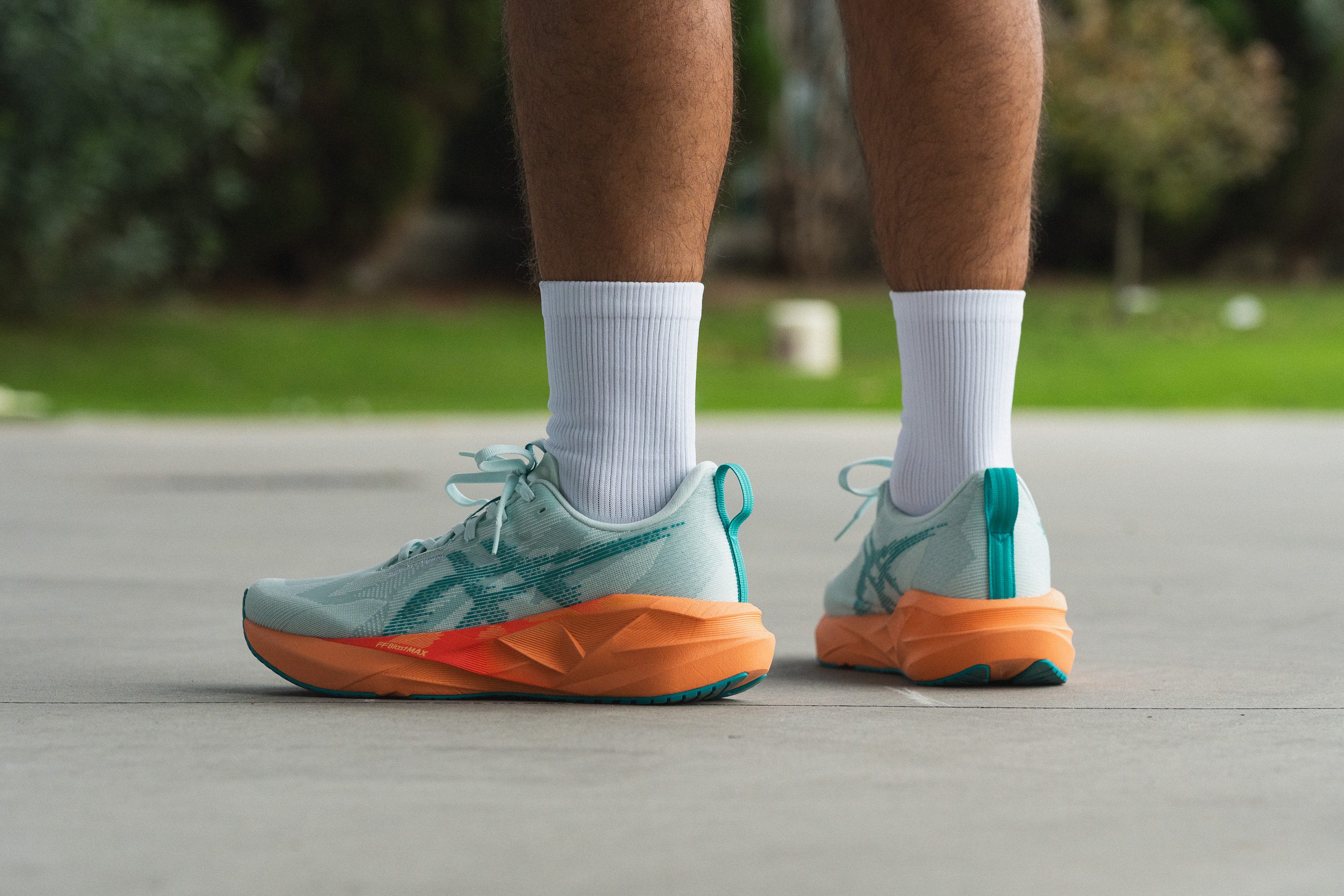
Who should NOT buy
The main update in the Novablast 5 is its softer foam, delivering a plush and cushioned ride. However, for runners favoring a firmer or more balanced feel underfoot, we recommend the Saucony Ride 17 or Brooks Ghost Max 2 as better options.
We also found grip to remain a concern, performing adequately on dry surfaces but falling short in wet conditions. For superior traction, the ASICS Superblast 2 is an excellent upgrade if budget permits, while the Puma Velocity Nitro 3 offers a more affordable alternative with excellent PumaGrip rubber.
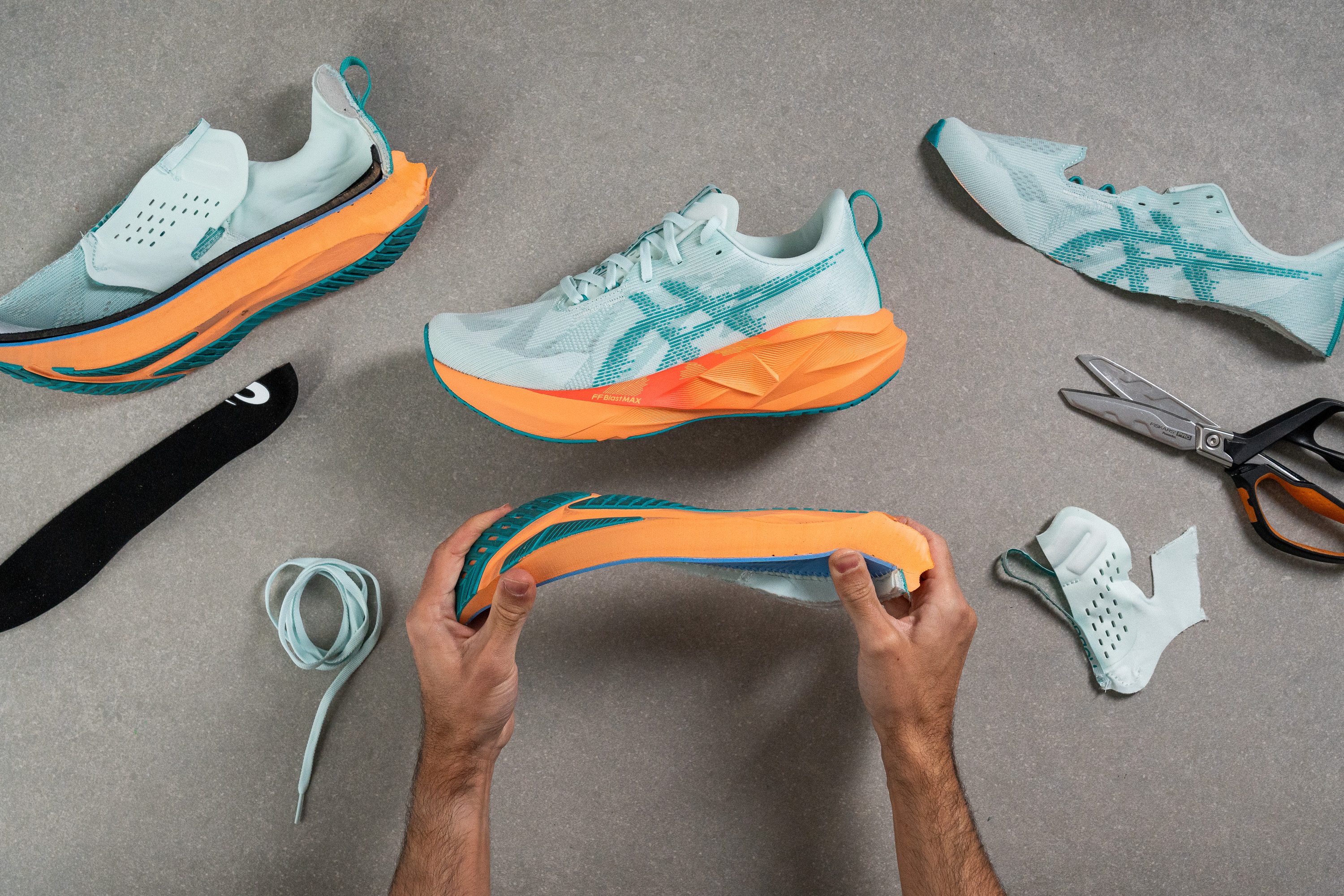
Lastly, the Novablast 5’s wide dimensions and maximalist stack height may not appeal to those seeking a more nimble, agile shoe. In that case, we believe that the Hoka Mach 6 clearly stands out as the better option.
Cushioning
Shock absorption
The new FF Blast MAX foam brings a clear upgrade in shock absorption over versions 3 and 4, as we confirmed in the lab. It now hits 141 SA in the heel and 134 SA in the forefoot, making it a top choice for runners who want maximum underfoot cushioning.
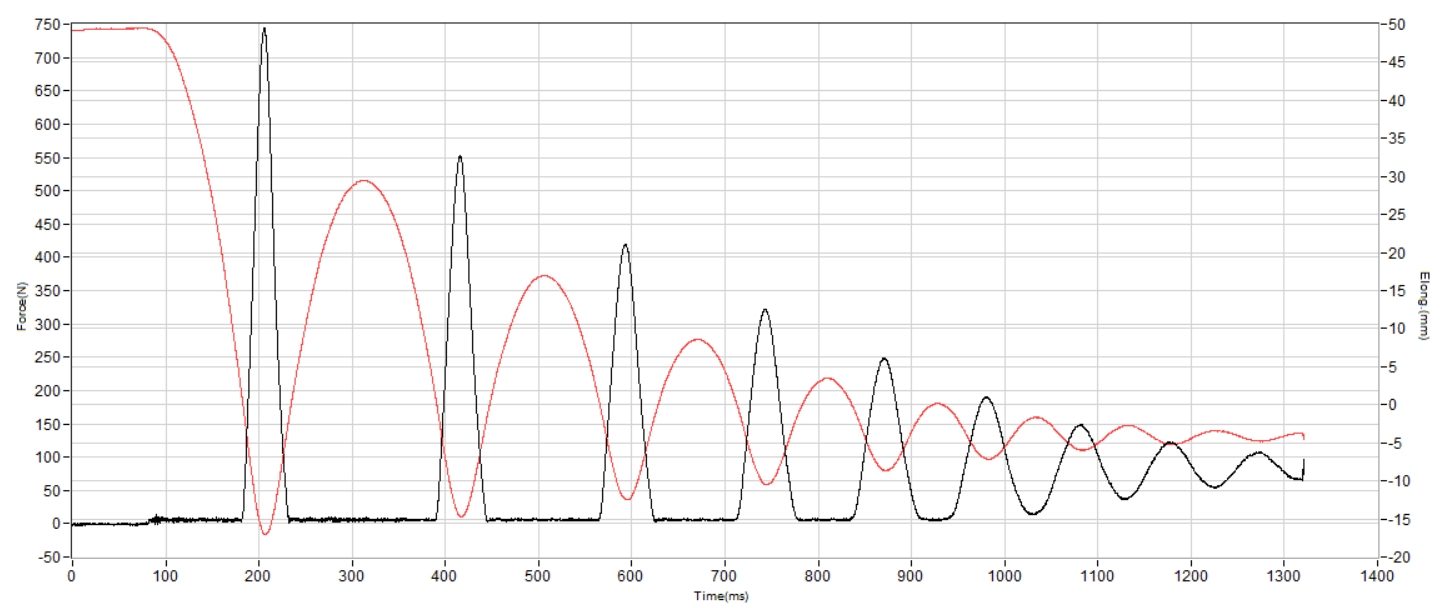
| Novablast 5 | 141 SA |
| Average | 130 SA |
Energy return
Energy return also received a much-needed upgrade with FF Blast MAX. While it still falls short of premium foams and most TPU-based options, we measured 63.6% in the heel and 66.5% in the forefoot, finally matching the expectations for this shoe and offering enough bounce for the occasional tempo run.
| Novablast 5 | 63.6% |
| Average | 58.6% |
Heel stack
For us, the realm of maximalist running shoes begins at 40 mm in the heel, and the Novablast 5 joins this select group despite being a lightweight daily trainer. In fact, we think that the Novablast series may have been the catalyst for the growing trend of using ultra-cushioned shoes for everyday runs.
ASICS claims the stack height matches its predecessor at 41.5 mm, but we discovered otherwise. Using our digital calipers, we measured 40.9 mm in the heel—the tallest Novablast yet. Version 3 measured 37.2 mm and version 4 reached 39.2 mm here in the lab, with all measurements done following World Athletics guidelines.
Based on these results, we believe the Novablast 5 offers an unmatched cushioning-to-price ratio. On the flip side, runners seeking a more traditional ride with plenty of ground feel will need to explore other options with thinner midsoles like the Nike Pegasus 41.
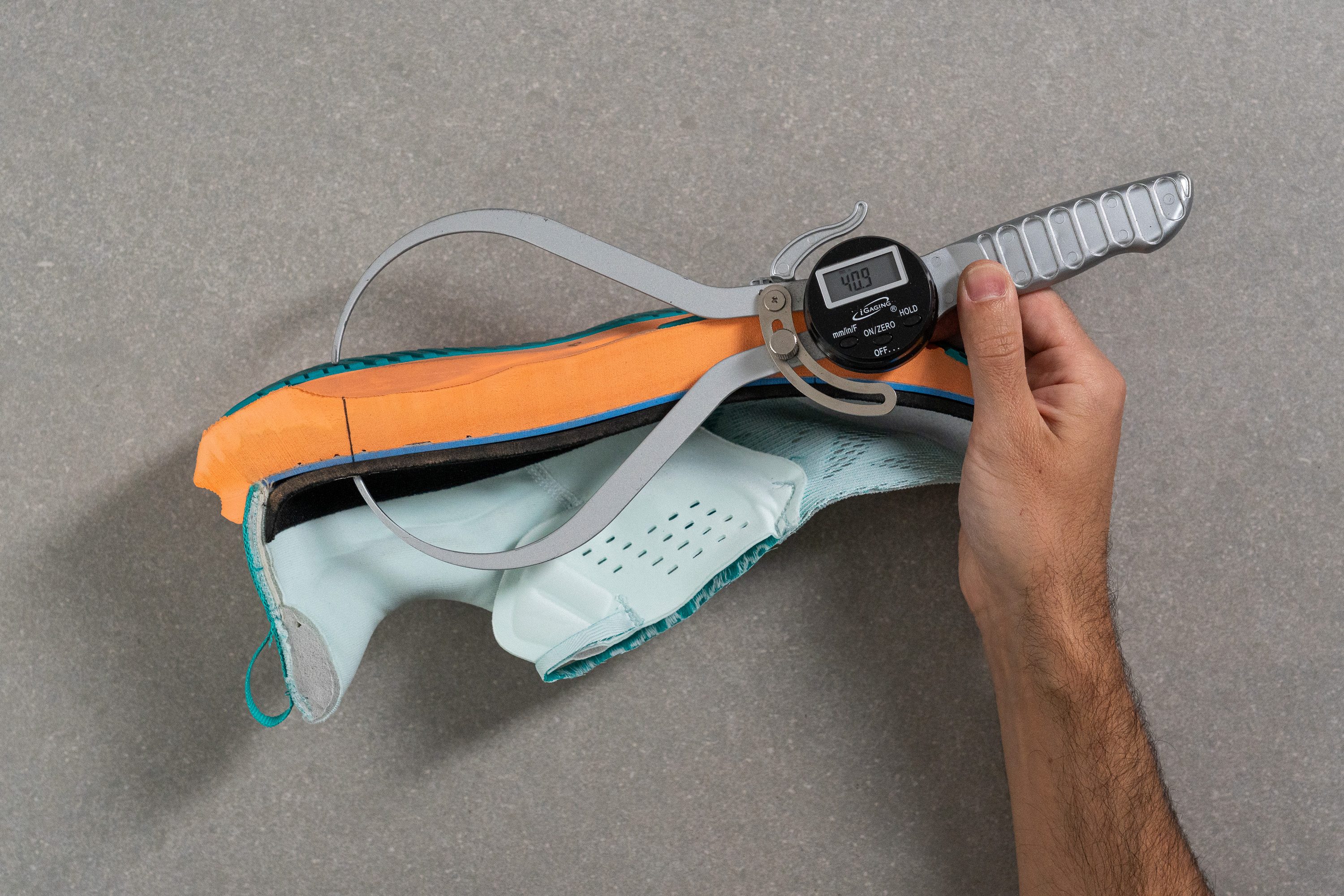
| Novablast 5 | 40.9 mm |
| Average | 34.8 mm |
Forefoot stack
If 40 mm is our benchmark for the heel to qualify as part of the maximalist club, we believe 30 mm defines the forefoot threshold. Impressively, the Novablast 5 surpasses it with a substantial 33.5 mm measurement.
Ground feel is almost non-existent, though slightly more noticeable than in earlier versions due to the softer foam and thinner outsole. And thanks to this generously-sized FF Blast MAX slab, the NB5 delivers exceptional muscle-and-joint protection, accommodating all foot strikes—even during the most demanding long runs.
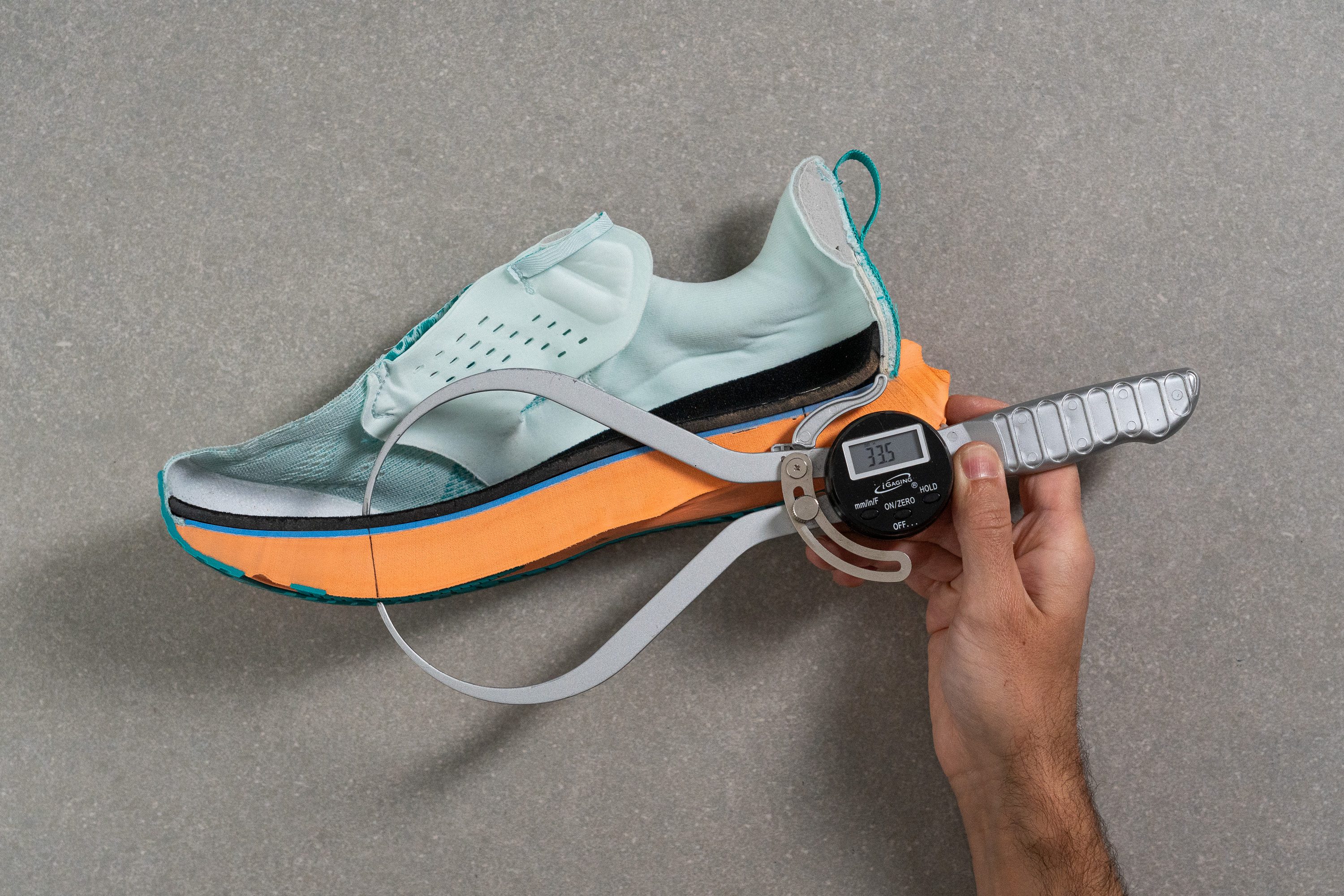
| Novablast 5 | 33.5 mm |
| Average | 26.2 mm |
Drop
ASICS claims an 8 mm drop for this shoe, and we measured an actual 7.4 mm. In our experience, this small variation fits perfectly within the expected 8-to-10-mm range for a versatile, all-footstrike daily trainer.
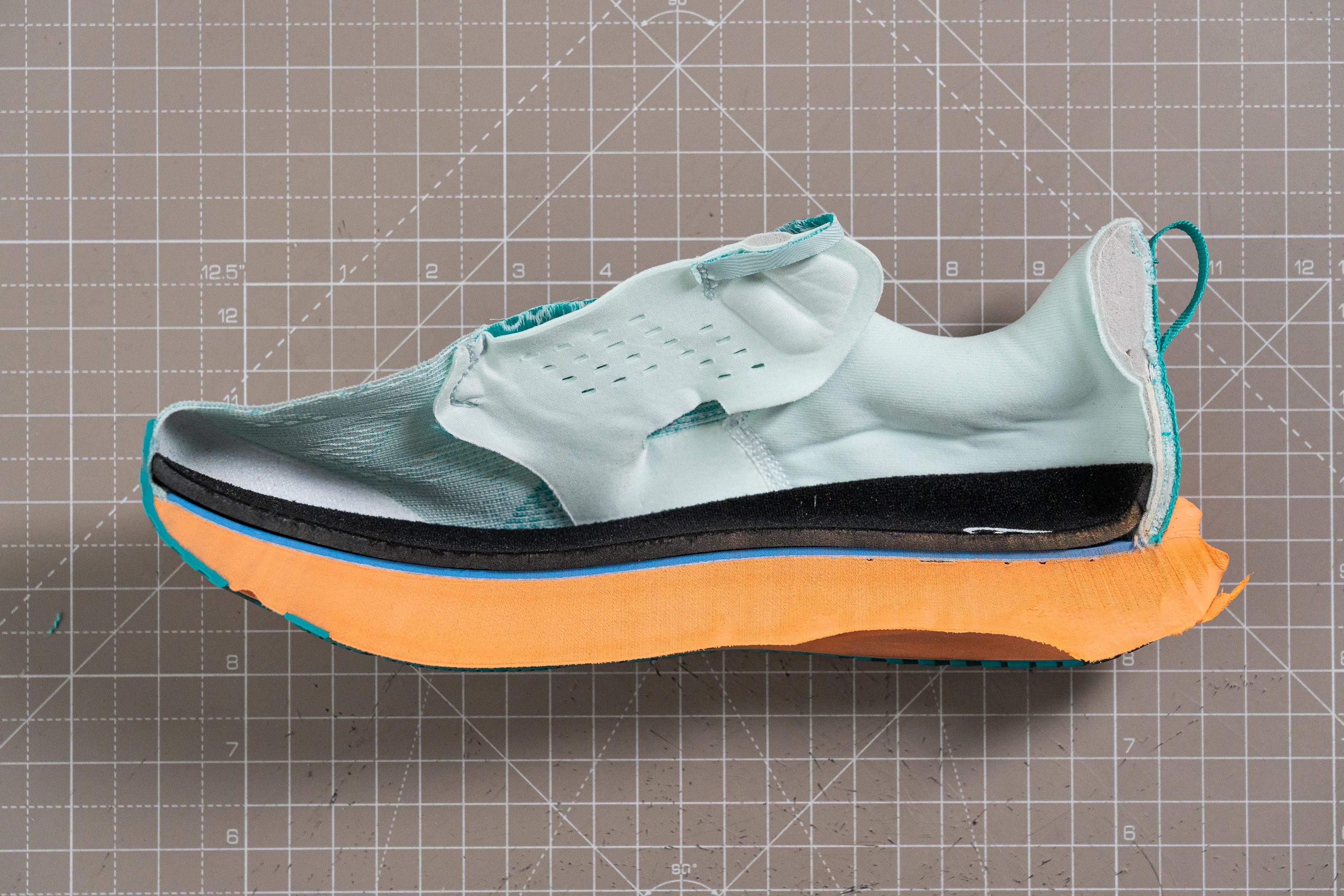
| Novablast 5 | 7.4 mm |
| Average | 8.6 mm |
Midsole softness
One of the biggest concerns we’ve heard from runners about the Novablast series is that it was losing its magic with every release. We remember when it debuted as a crazy-bouncy shoe in 2020, but with each new version, ASICS seemed to tone down the fun to make it more democratic—yet less thrilling. We shared those concerns. Until now.
The most significant upgrade in version 5—and the main reason to consider it—is the all-new FF Blast MAX foam. This compound is softer and springier than its predecessor, offering what ASICS claims is an 8.5% increase in energy return. After switching back and forth between v4 and v5, we’re completely confident this upgrade is an improvement for most runners.
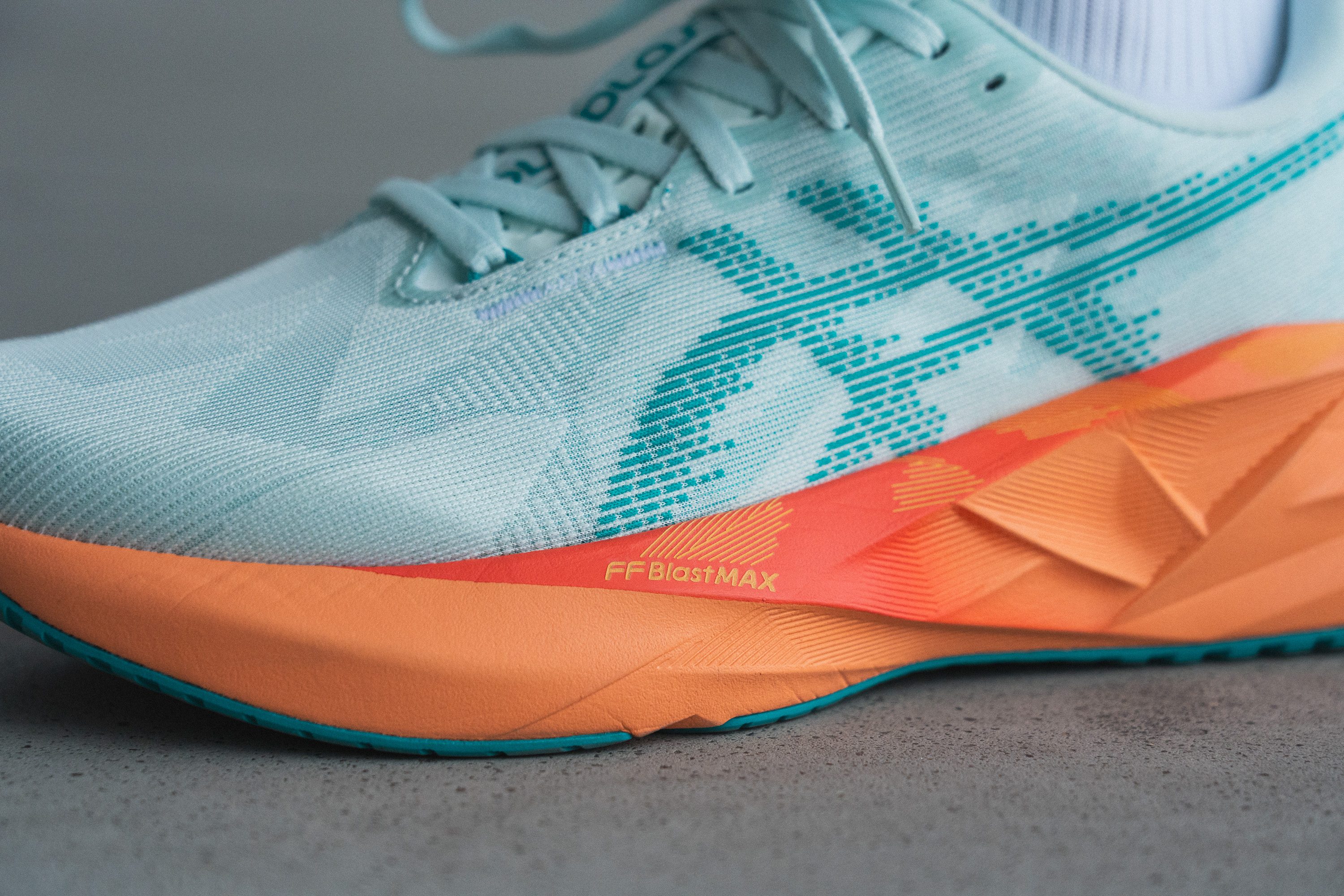
When we pressed our Shore A durometer to measure the midsole’s softness, it read just 13.0 HA, making it the plushiest Novablast yet and noticeably softer than the average shoe. If you’ve been looking for a cloud-like ride or felt the Novablast 4 was too firm, version 5 finally delivers.
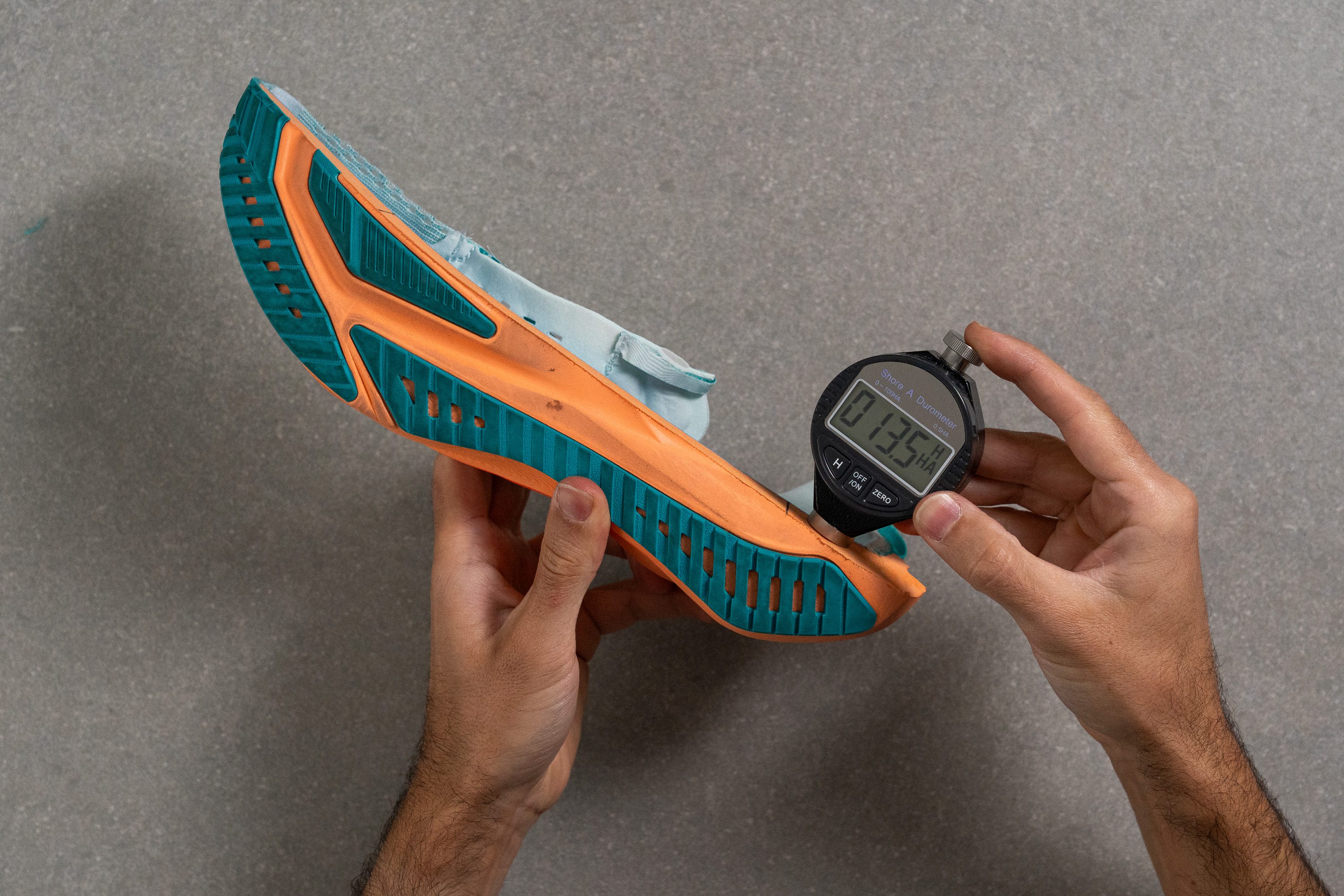
| Novablast 5 | 13.0 HA |
| Average | 20.4 HA |
Rocker
One of the most noticeable changes in the Novablast 5 compared to its predecessors—especially the 4th generation—is the heel bevel. The Novablast 4 featured a large heel extension designed for early contact, which, in our view, felt excessive for a daily trainer. Therefore, we weren’t surprised to discover that ASICS removed a significant portion of the heel in version 5.
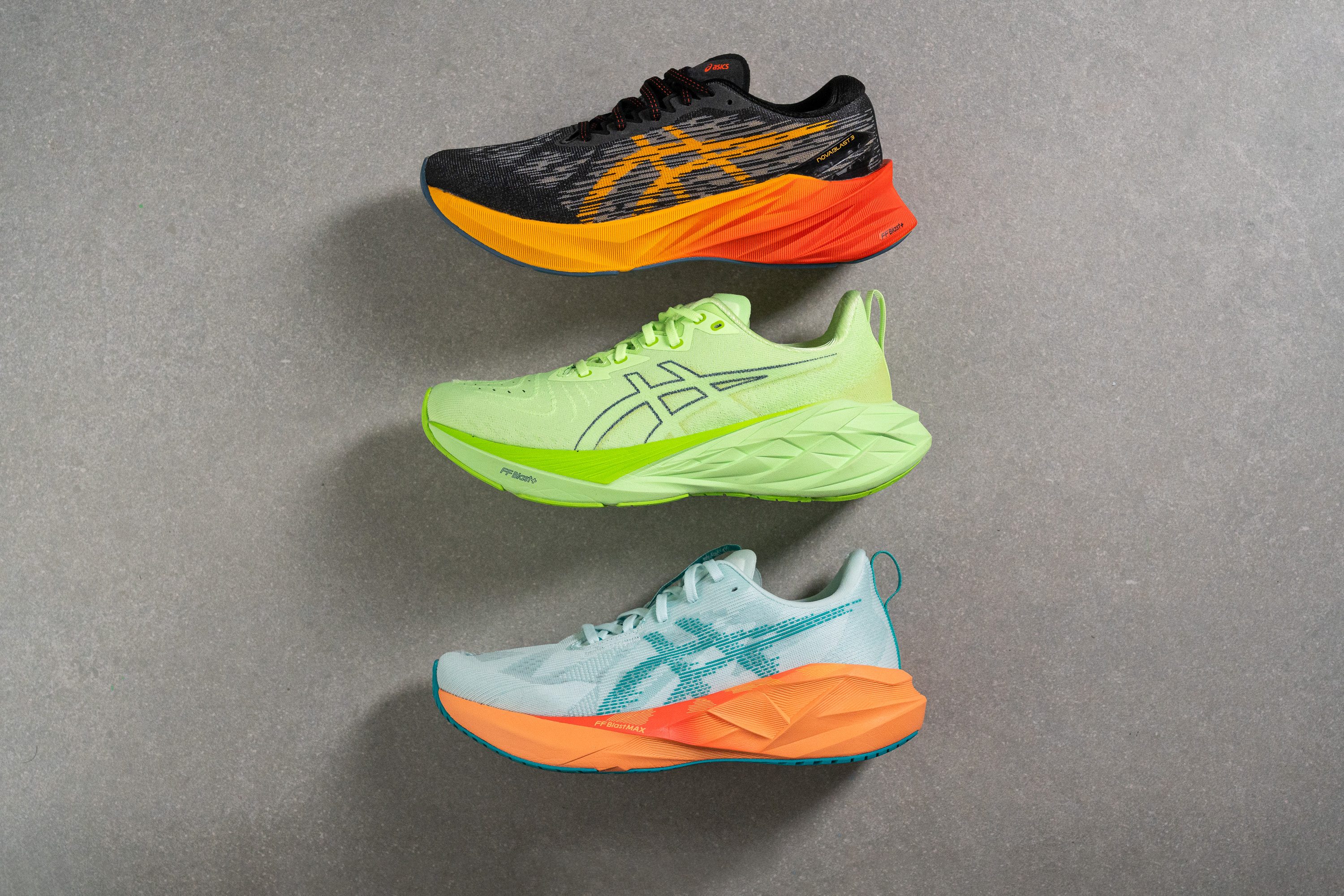
The forefoot rocker design is very similar to both v3 and v4, as we discovered in our runs that it retains a similar feel when compared to its predecessors. In our view, the late and mild forefoot rocker delivers a natural and smooth sensation during runs.
This choice complements the Novablast 5's design perfectly. Without any plate embedded in the midsole, a subtle rocker works effectively, especially for easy paces.
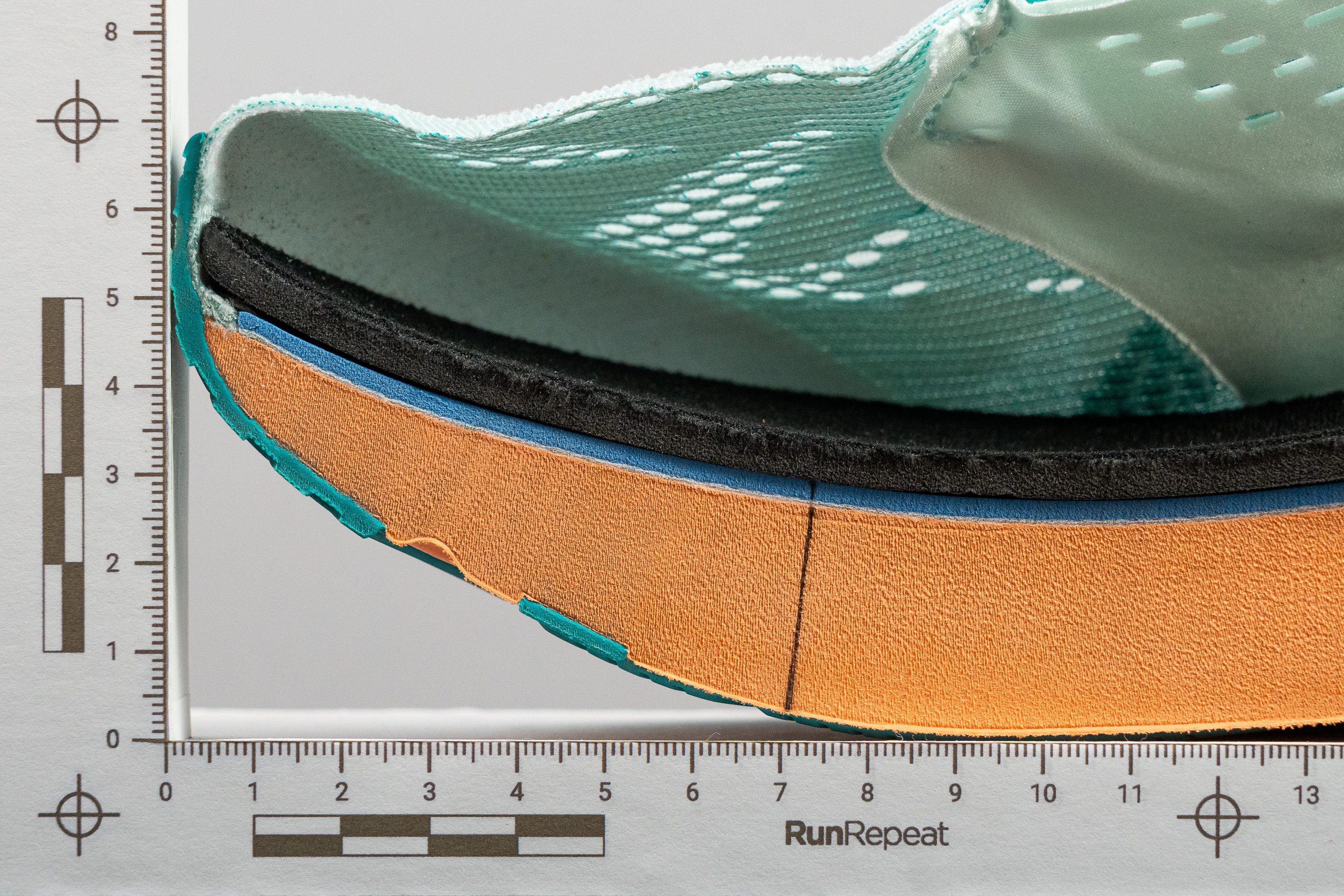
FF Blast MAX
FF Blast MAX is the most significant and noticeable upgrade in the Novablast 5, but what exactly is it? ASICS hasn’t disclosed its composition, and since this foam is relatively new, there’s still much to learn about it.
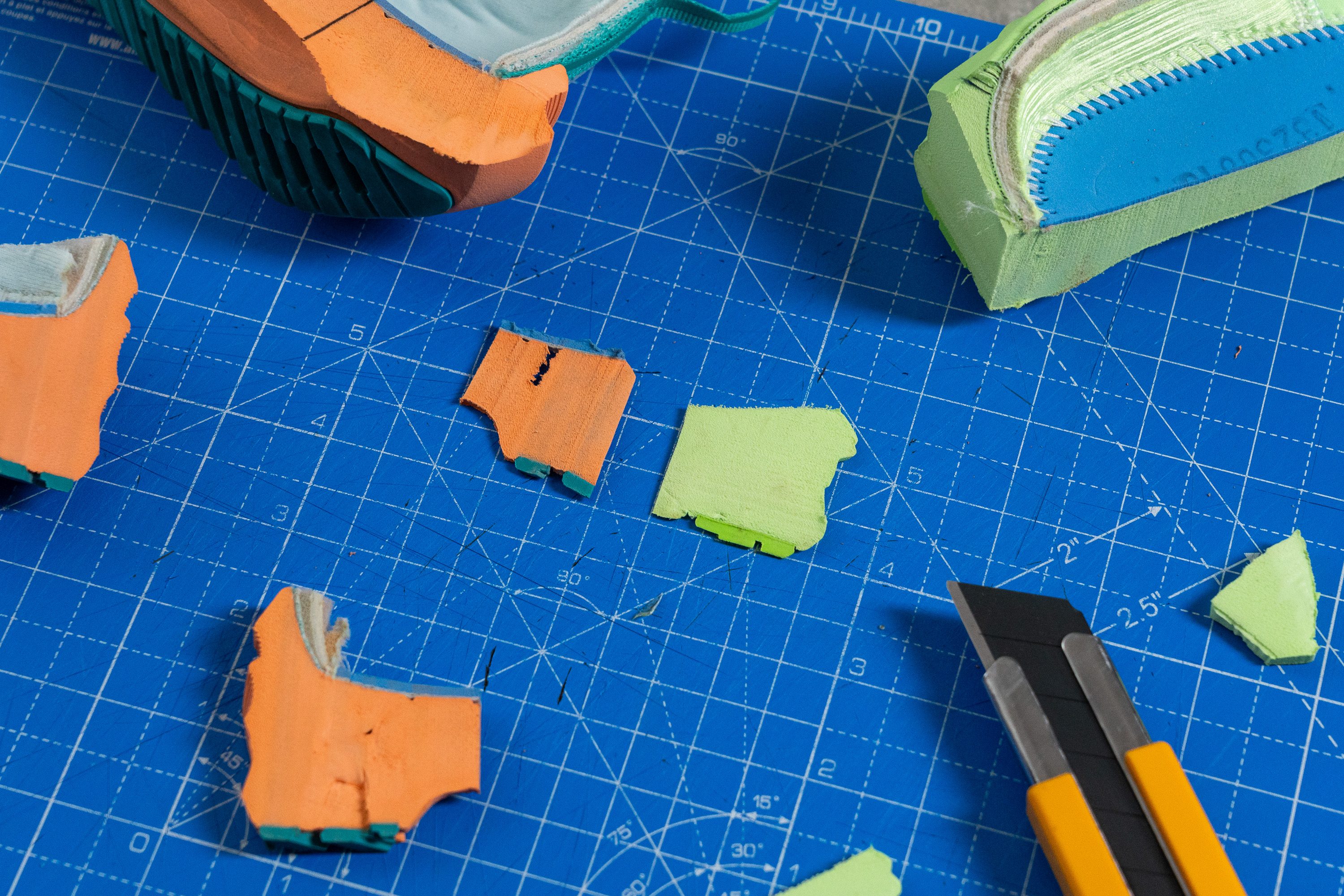
Of course, we cut some foam slabs from both the Novablast 4 and 5 for comparison. We discovered that the Novablast 5's FF Blast MAX is a lower-density foam with more open cells, allowing greater compression and creating a softer underfoot feel compared to FF Blast+ ECO.
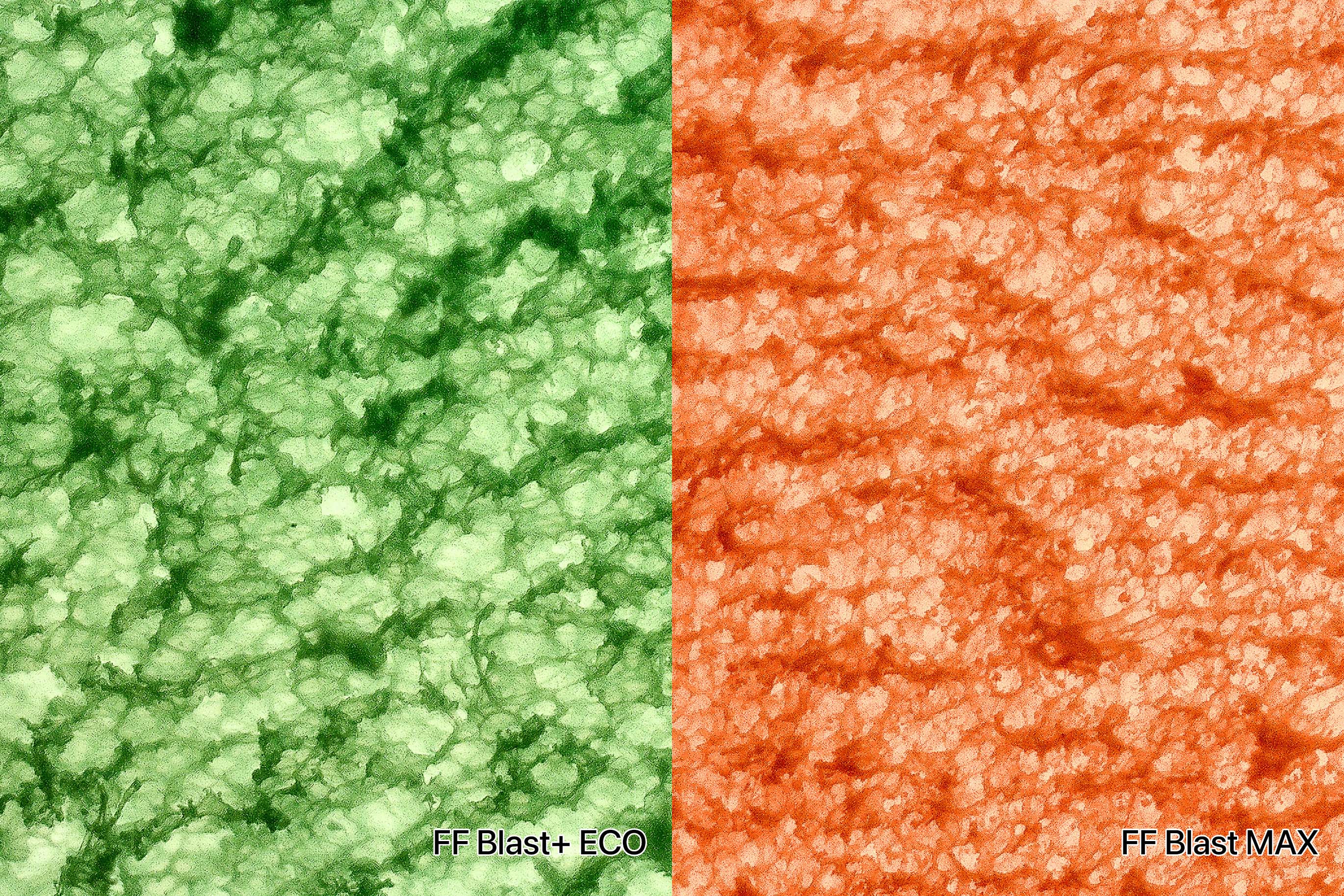
Under our microscope, we didn't find the usual bubbles from nitrogen-infused foams, and it’s evident that this isn’t a PEBA supercritical blend. As a result, it functions purely as a training foam and isn’t ideal for performance-obsessed runners. However, at a $150 price point, world-class energy return wasn’t expected anyway!
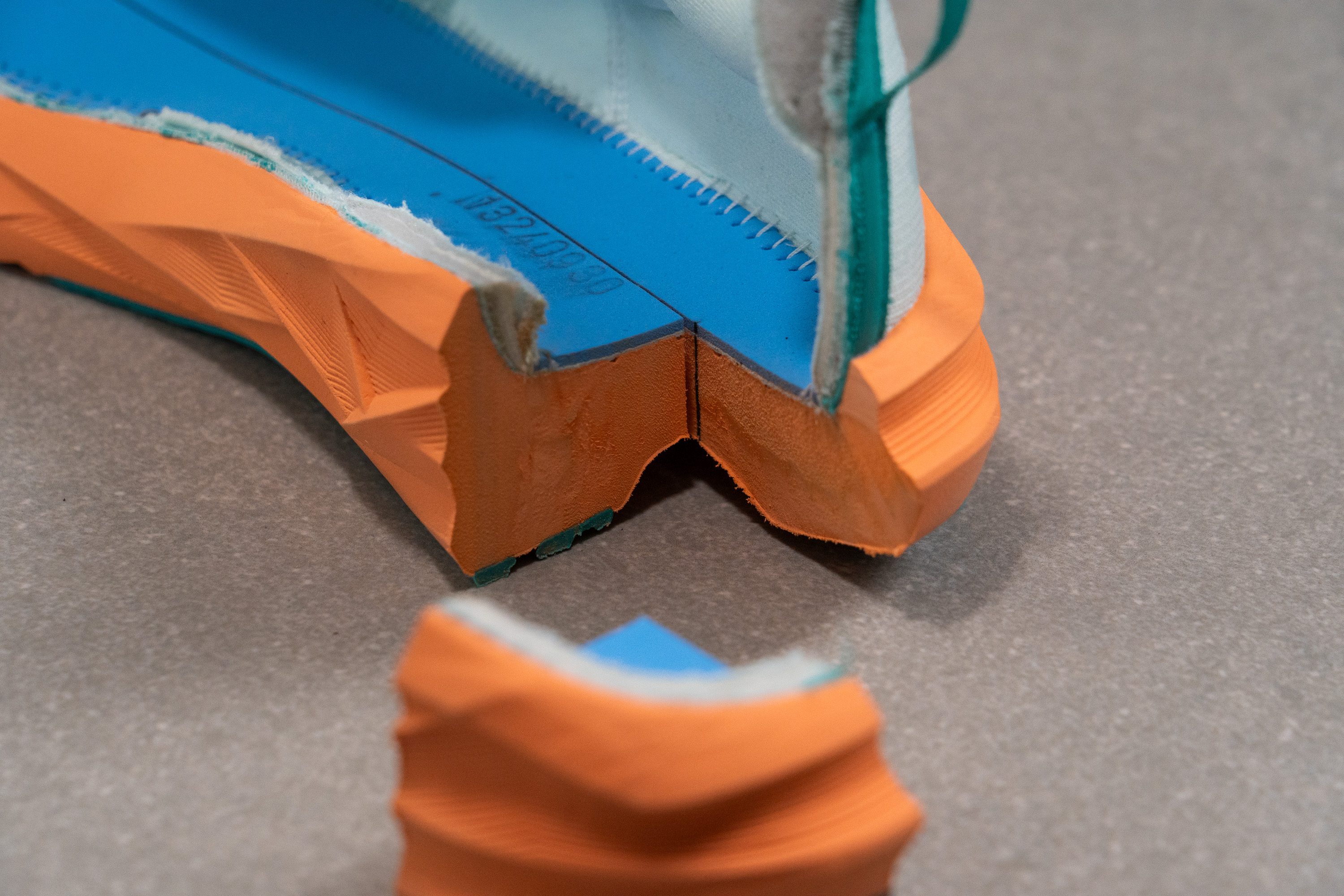
Size and fit
Size
ASICS Novablast 5 fits true to size (587 votes).
Internal length
| Novablast 5 | 274.6 mm |
| Average | 269.4 mm |
Width / Fit
The fit of the Novablast 5 feels similar to earlier versions, but we found that this version offers slightly more space compared to the NB4.
We measured the shoe width at 97.5 mm in the widest part of the upper—a design that works well for runners with average or slightly broad feet. For those needing even more space, the Wide size (available in select countries) is a great option, with the Altra VIA Olympus 2 as a backup for those who want or need a super-wide fit.
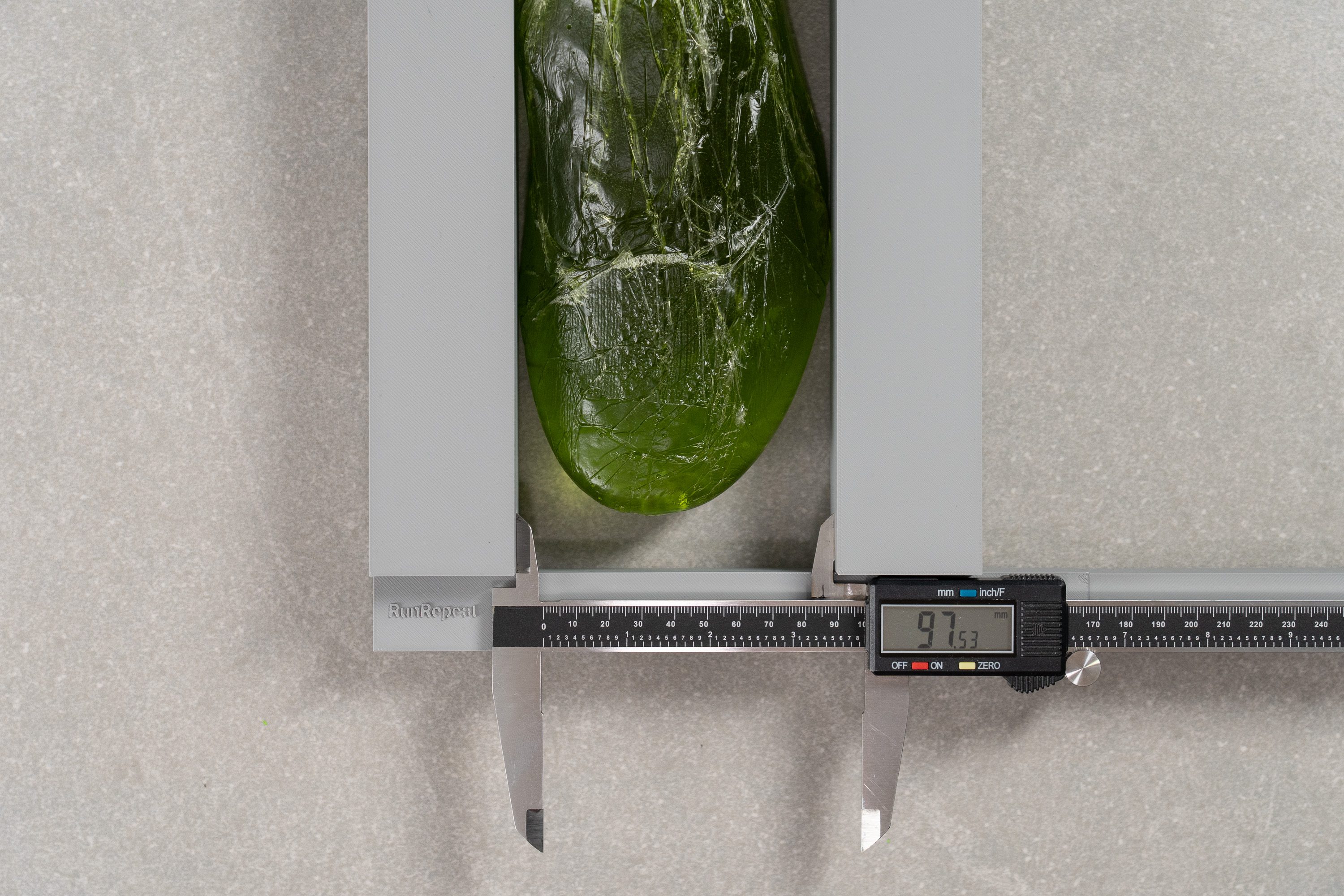
| Novablast 5 | 97.5 mm |
| Average | 95.1 mm |
Toebox width
Our second measurement is crucial for evaluating toebox space, as overly tapered designs can severely impact comfort. We noted that ASICS tweaked the Novablast 5 with a slightly more accommodating, toe-friendly design than previous generations at 74.4 mm.
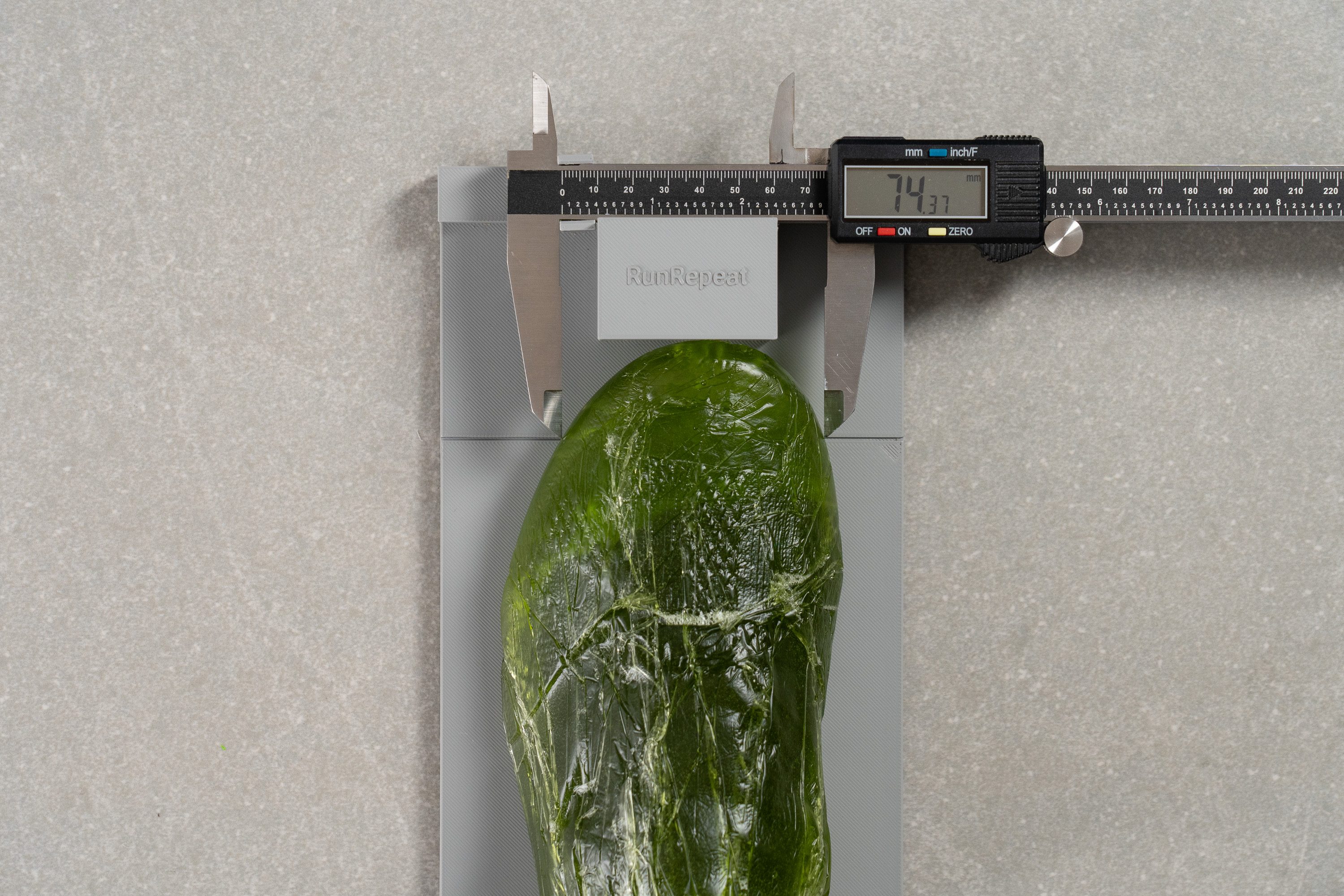
| Novablast 5 | 74.4 mm |
| Average | 73.3 mm |
Toebox height
In terms of height, ASICS took a straightforward approach by opting for an average-height toebox, and in our experience, the Novablast 5 provided consistent comfort across all distances we tested.
On top of that, the upper material is quite comfortable, making it difficult to imagine anyone experiencing blackened toenails in this shoe—assuming the correct size is chosen.
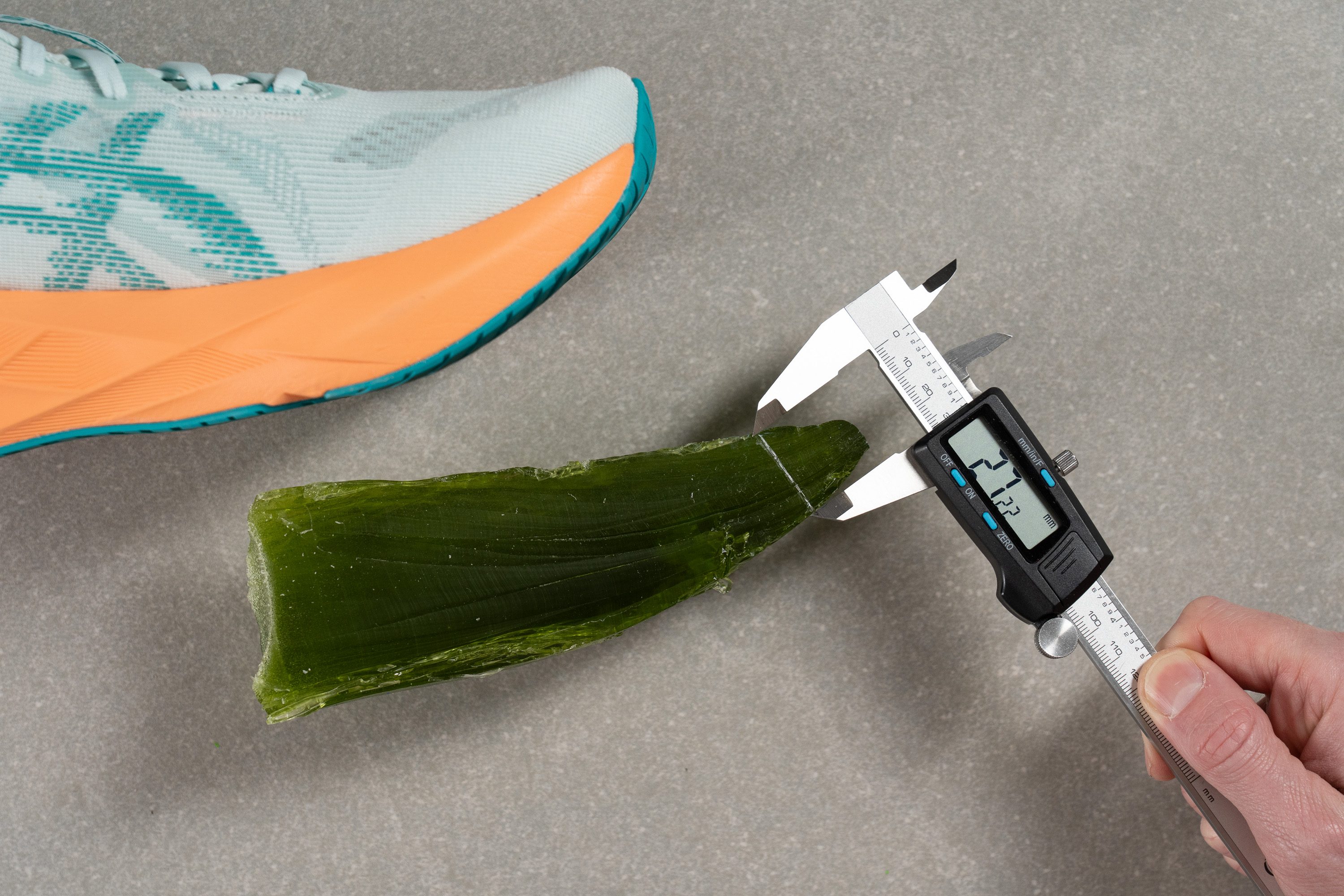
| Novablast 5 | 27.2 mm |
| Average | 27.0 mm |
Traction / Grip
Traction test
The ASICS Novablast 3 scored 0.39 in our traction test, which felt just okay for a shoe that was flying off the shelves. We tested it thoroughly and noticed its average-at-best, grip-on-demand feel. Then came version 4, and we hoped for an upgrade—which happened, as it reached a 0.47 score.
And now, in version 5, ASICS has truly stepped up with a 0.53 score in our wet-grip test. This shoe finally delivers solid grip that confidently clears the bar.
| Novablast 5 | 0.53 |
| Average | 0.49 |
Outsole design
The ASICS Novablast 5 features a partially covered outsole with strategically placed AHAR LO, a lighter, low-density variation of AHAR and AHAR+. These segments are concentrated in high-wear zones across the forefoot, lateral edges, and heel. The rest of the sole exposes the midsole foam, designed with a carved central channel that runs through the length of the shoe.
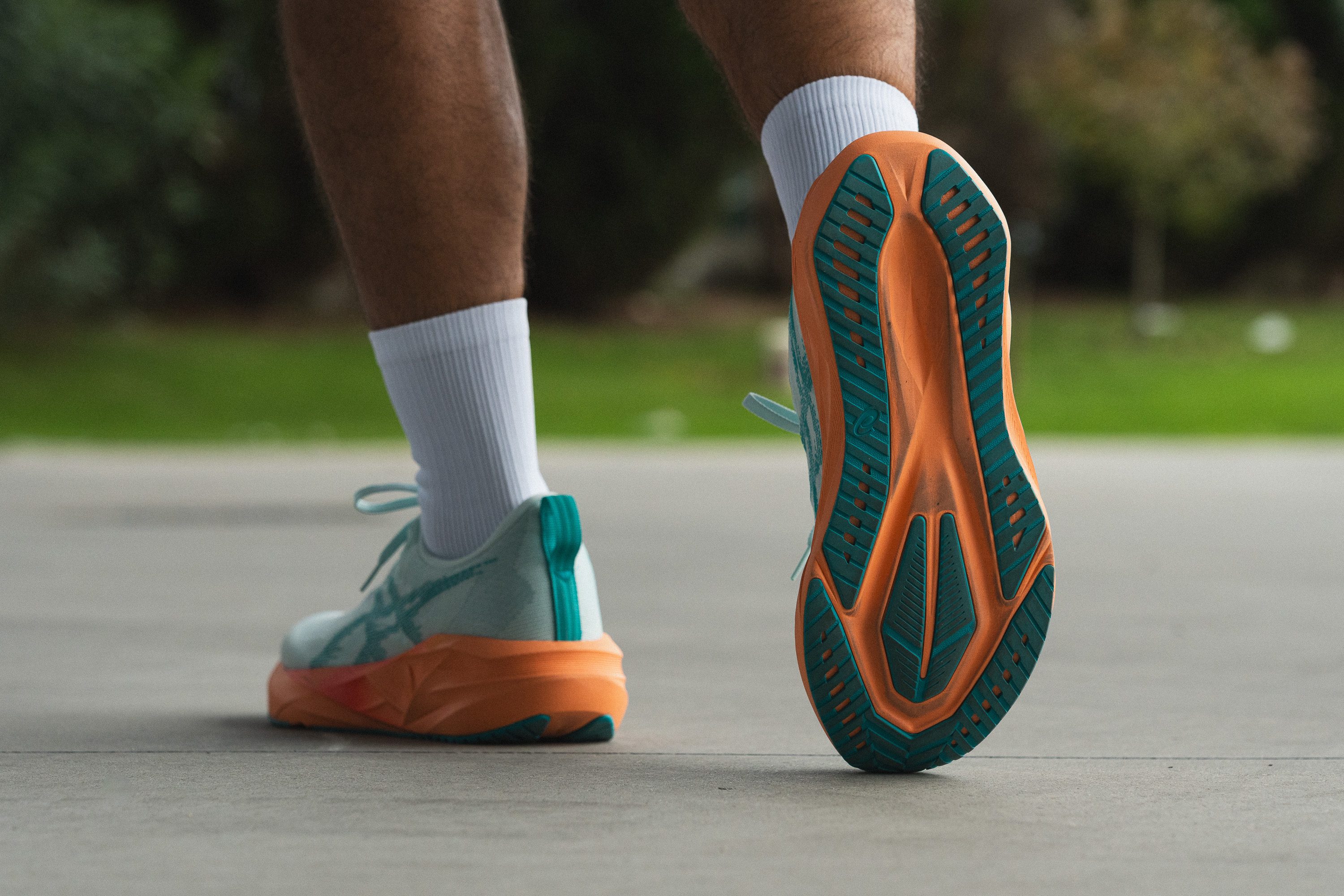
Flexibility / Stiffness
When a shoe increases its stack height, one potential drawback is reduced flexibility—an important consideration for a daily trainer that doubles as an everyday option. But we found that thanks to the new FF Blast MAX foam and the redesigned outsole, ASICS even improved this feature from version 4.
In our 30-degree bend test, we discovered it took only 11.2N of force to flex the Novablast 5 to the desired point—a significant improvement over the 17.8N required for the NB4. This makes walking, jogging, and slow-paced running feel noticeably more comfortable.
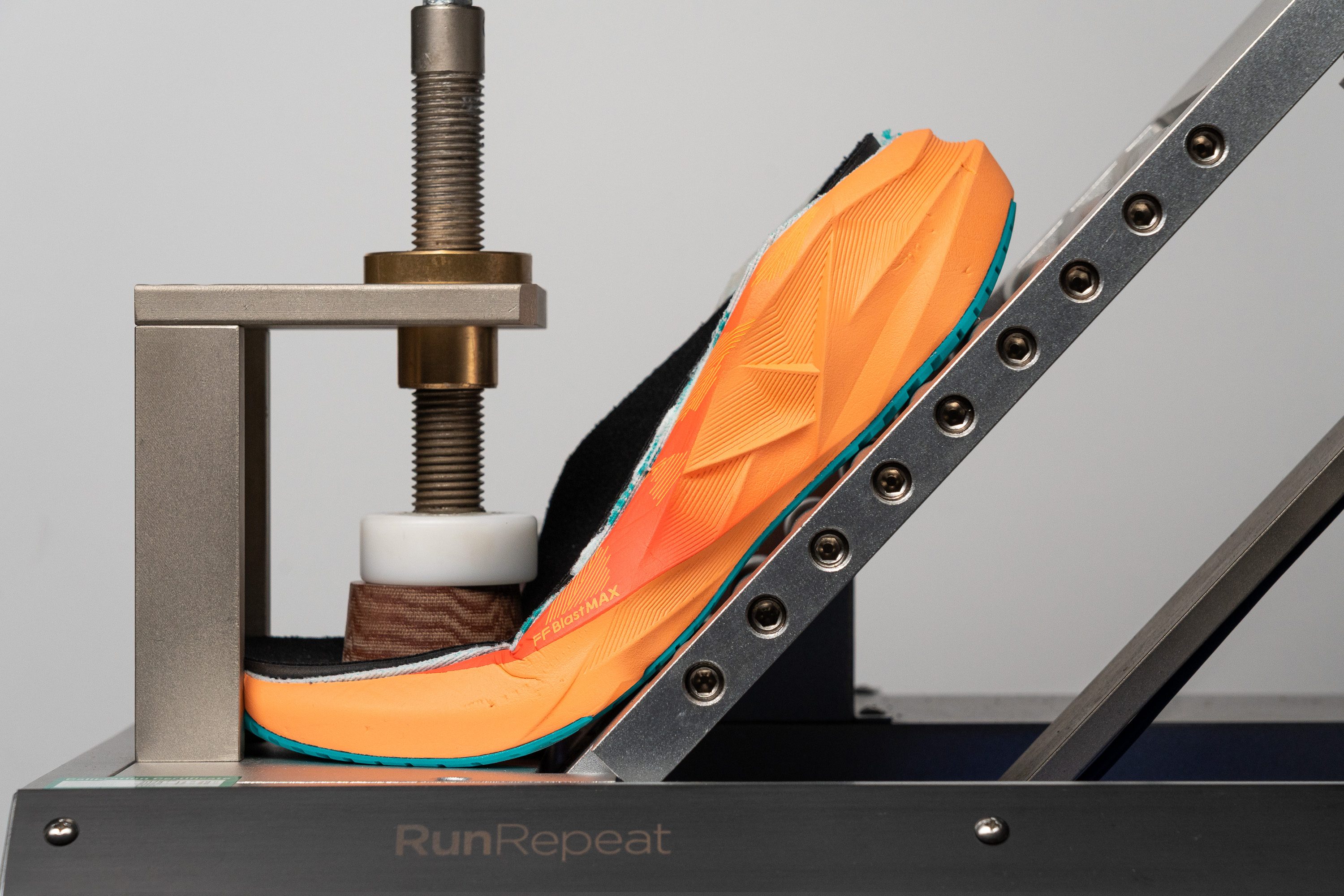
| Novablast 5 | 11.2N |
| Average | 15.3N |
Weight
Despite being a comfortable running shoe with sky-high dimensions and an even greater stack height than its predecessor, ASICS achieved a lighter build. It’s only a few ounces, but still impressive!
We found this massive shoe weighs just 8.95 oz or 254g. For context, the popular Brooks Ghost 16, which has significantly less cushioning underfoot, tips the scales at 9.4 oz or 266g.
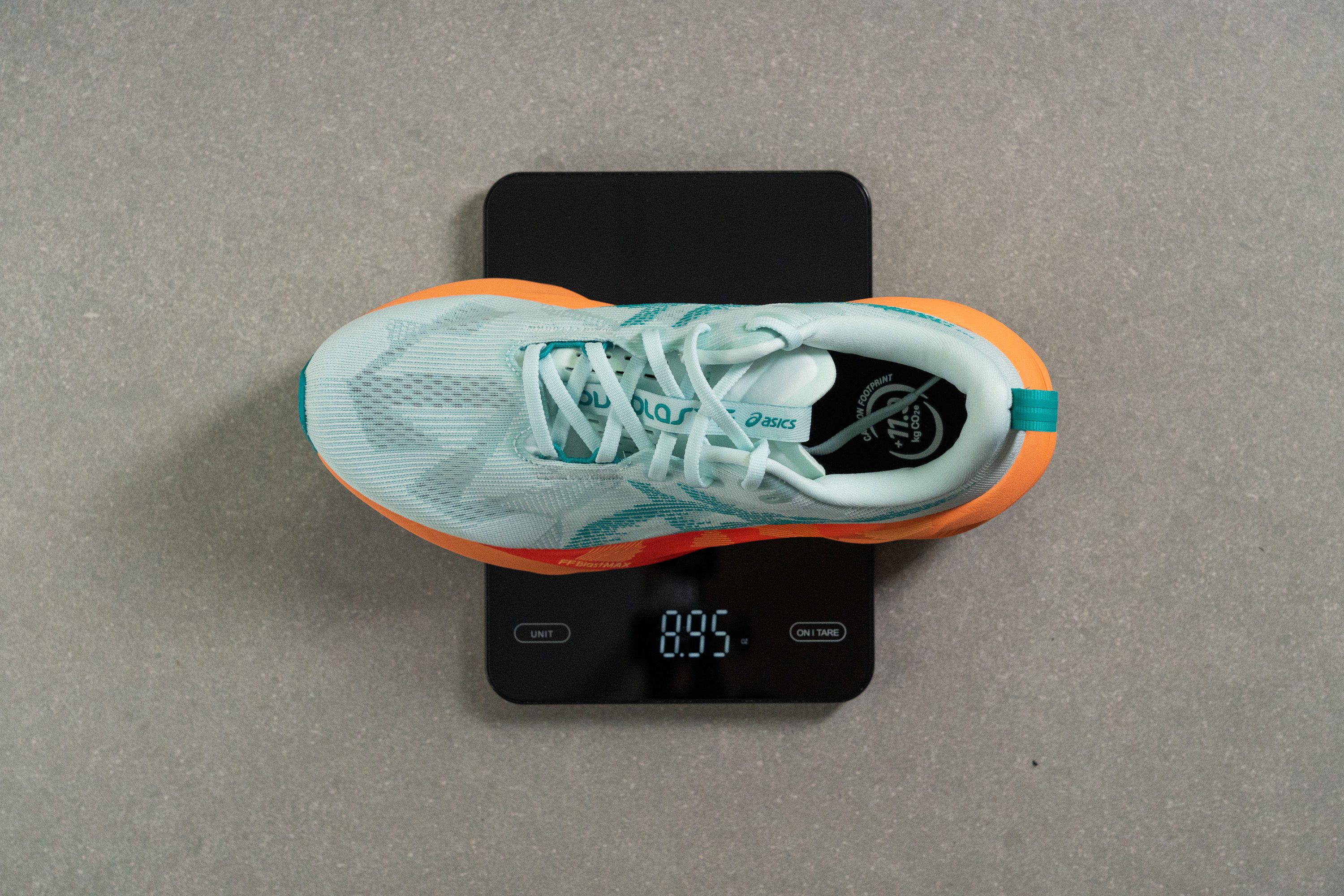
| Novablast 5 | 9.0 oz (254g) |
| Average | 9.3 oz (264g) |
Breathability
One noticeable aspect of the Novablast 5 is its return to the jacquard mesh upper reminiscent of version 3, which had been replaced in version 4. In our opinion, it’s visually striking—but does it perform under heat?
We found that it does moderately well. After testing it with our smoke-pumping machine, we assigned it a 3/5 ventilation score. This outcome ensures year-round comfort, but for scorching summer days, pairing it with ultra-thin, moisture-wicking socks is essential to prevent overheating.
Using light, we observed ASICS’s thoughtful design approach for the upper. The toebox features an intricate pattern of thinner sections to allow hot air to escape, alternating with thicker spots. Additionally, the tongue impressed us with its excellent ventilation, incorporating numerous large holes for airflow.
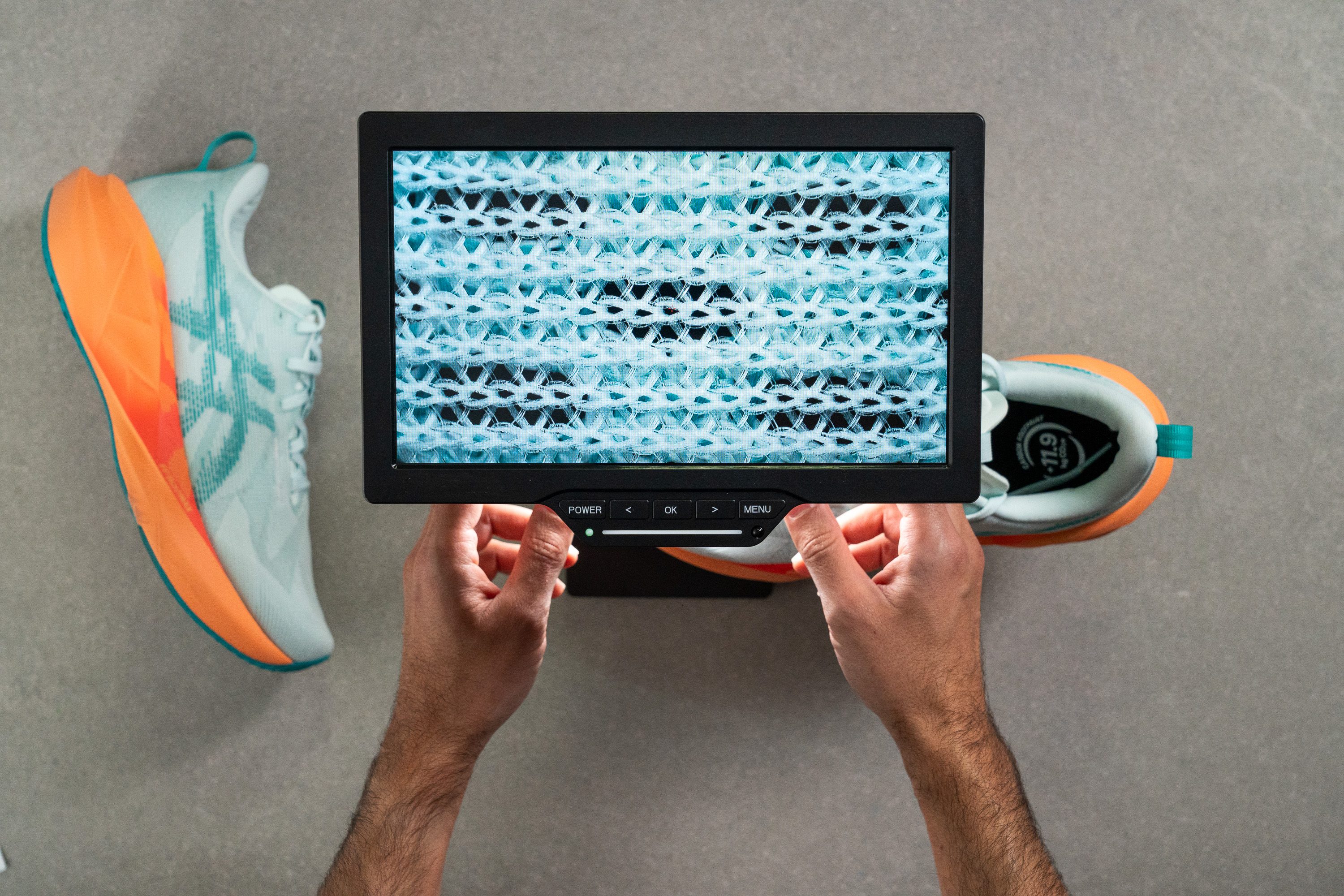
To dive deeper, we examined the upper under a digital microscope. Surprisingly, we found the thinner mesh layer on the outside—a rarity, as the thicker layer is typically placed on top. This detail highlights the refined craftsmanship of this model.
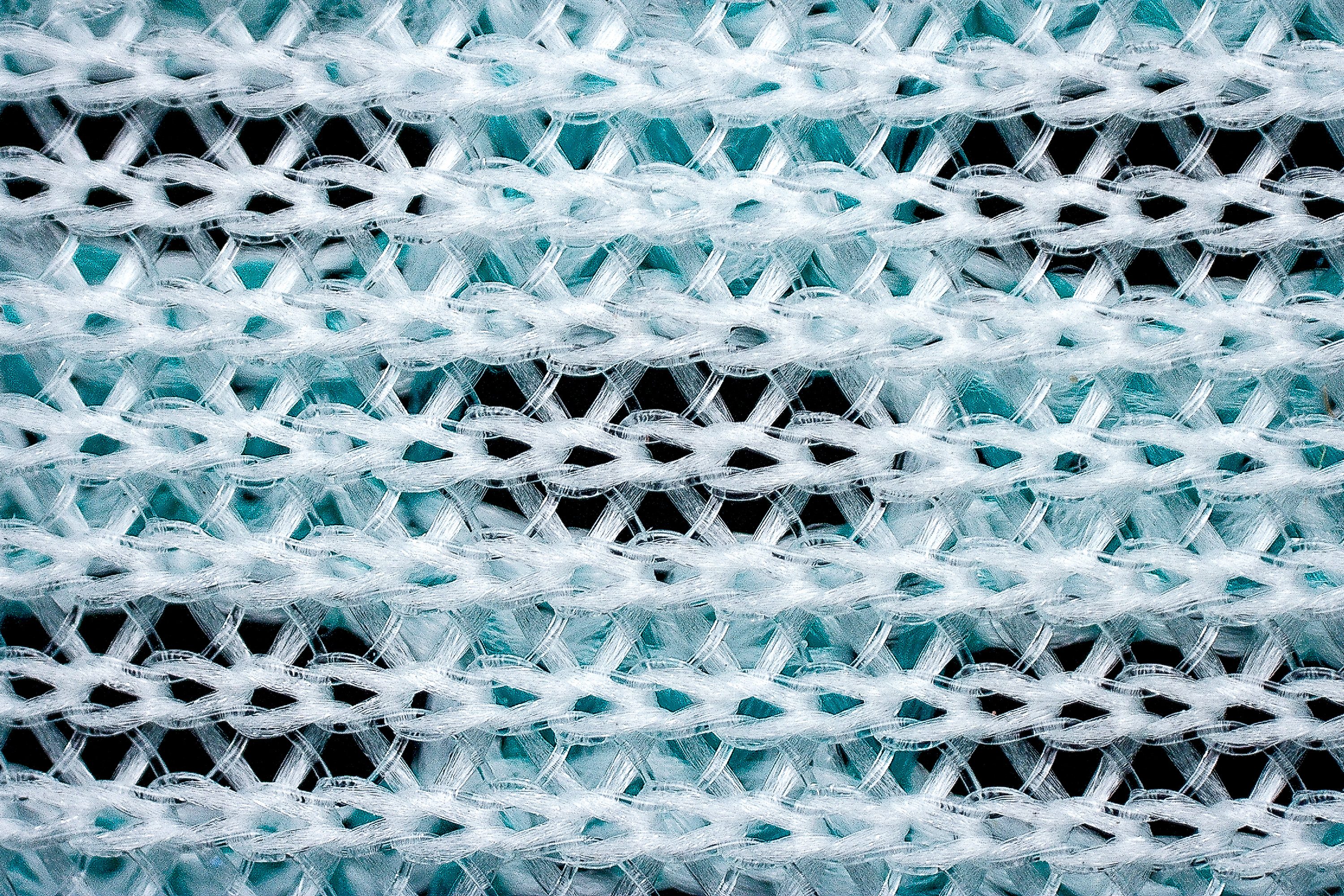
In our experience, this is the best upper yet in the Novablast series and a remarkable one in its price range.
It excels in comfort at the heel with pillow-like padding, while the front benefits from weight-saving materials. However, despite the absence of potentially irritating seams, the toebox feels slightly rough at touch, making it not a good option for sockless wear.
| Novablast 5 | 3 |
| Average | 3.7 |
Stability
Lateral stability test
Since the launch of the Novablast 3, ASICS has excelled in the stability department for neutral running shoes by blending several elements—notable midsole sidewalls, broad dimensions, and a high level of torsional rigidity. This combination delivers stability for neutral runners even with the shoe’s super-high stack height.
With the Novablast 5, they’ve done it again. Despite our feet sitting higher than in the Novablast 4 and pressing into a softer foam, we found it almost equally stable. Perhaps it’s just a touch less stable than the Novablast 4, but the difference is almost imperceptible.
However, despite these features, we believe this shoe is best suited just for neutral runners. Those with mild stability needs should consider the ASICS GT 2000 13, while individuals requiring significant support are better off with the Gel Kayano 31.
Torsional rigidity
If something works, don’t change it. That seems to be ASICS' philosophy regarding torsional rigidity in the Novablast, as it retains the same 4/5 score from last year. But we think it might feel slightly rigid for some, and if that’s your concern, the more flexible design of a premium daily trainer like the Nike Vomero 17 could be a better choice.
| Novablast 5 | 4 |
| Average | 3.5 |
Heel counter stiffness
The heel counter boasts enhanced padding compared to last year, significantly increasing comfort, while maintaining the same reasonable stiffness score of 3/5. It feels unobtrusive, and the signature extension toward the Achilles tendon provides excellent comfort during long runs.
| Novablast 5 | 3 |
| Average | 2.9 |
Midsole width - forefoot
At 122.3 mm in the widest part of the forefoot, the Novablast 5 offers dimensions similar to a stability shoe. We found this necessary for proper balance with its towering 40 mm stack height, but it might not appeal to fans of classic daily trainers with more agile builds.
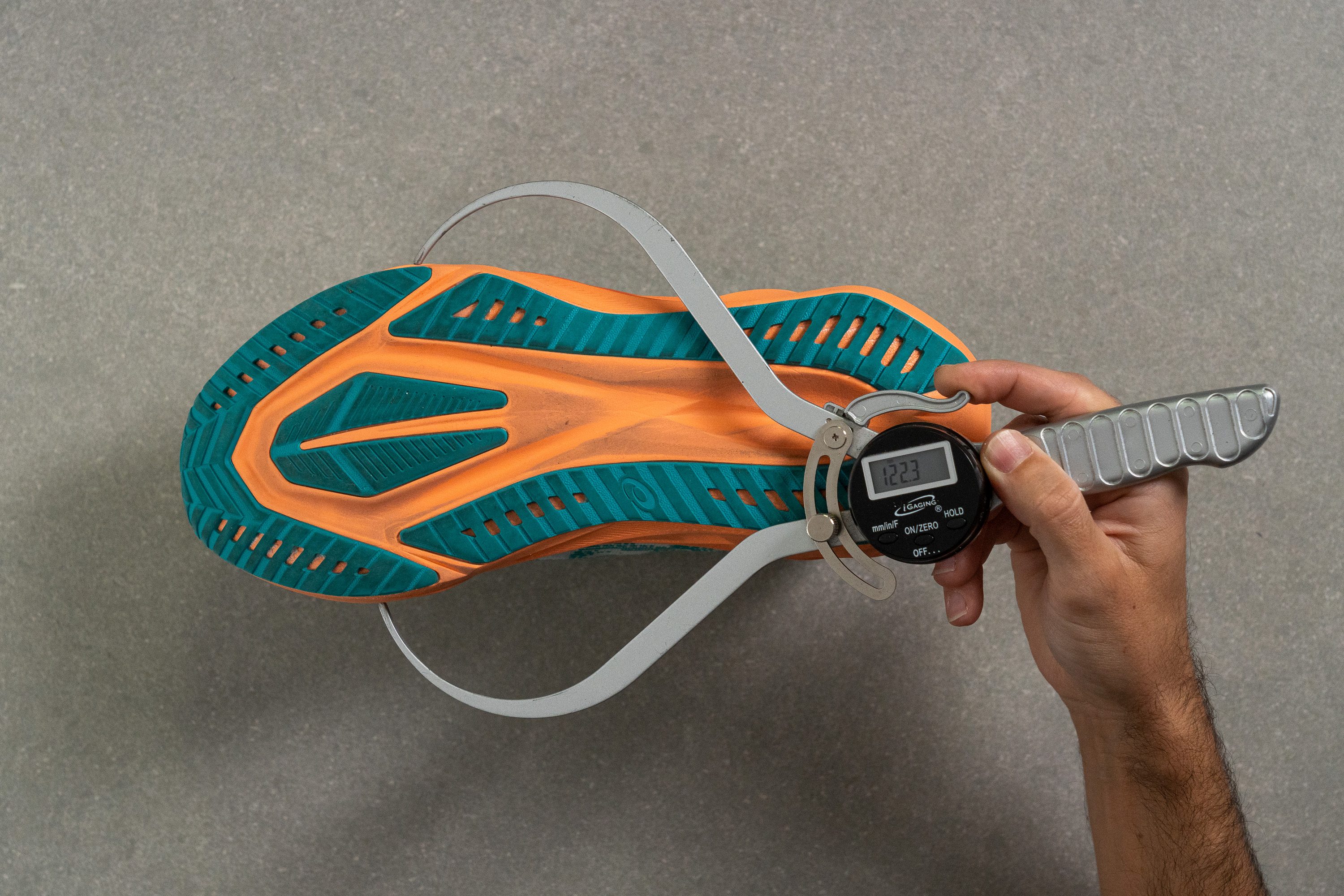
| Novablast 5 | 122.3 mm |
| Average | 114.4 mm |
Midsole width - heel
We got the same impression with the heel—it felt remarkably broad during runs, creating a confidence-inspiring landing platform that naturally stabilizes the ride. We confirmed this feeling with a 97.6 mm measurement back in the lab.
But again, this comes at the cost of agility. A broad platform like this sacrifices some nimbleness to ensure the shoe remains usable for a wide range of runners. Without this trade-off and those massive sidewalls, the Novablast 5 would have been overly unstable and suited only for those with flawless neutral gait.
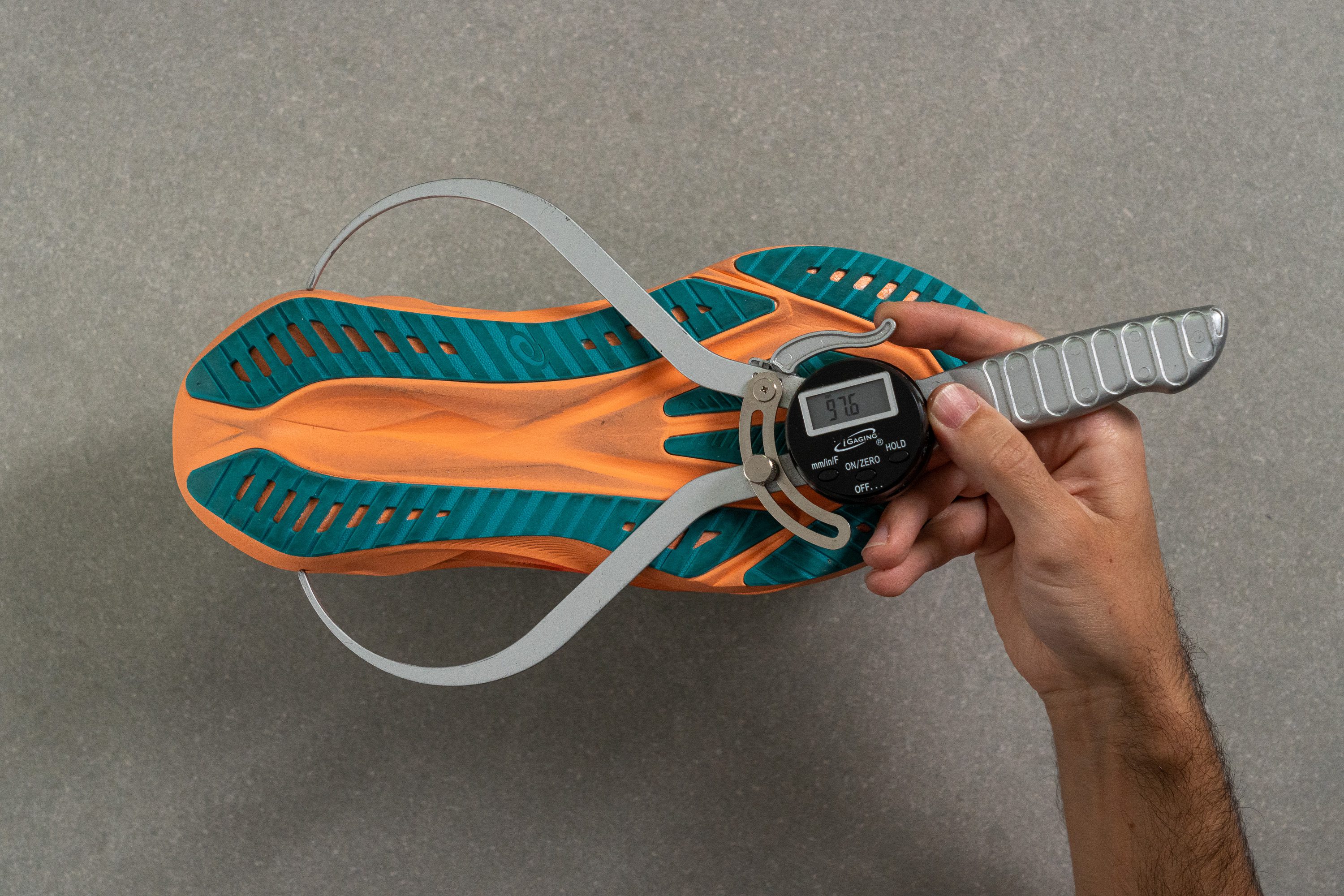
| Novablast 5 | 97.6 mm |
| Average | 90.6 mm |
Durability
Toebox durability
While the upper’s design is visually stunning and offers decent ventilation, we suspected it would falter in durability during our toebox Dremel test. The thin material, lacking any robust reinforcement elements, made it inherently vulnerable.
Therefore, the 1/5 durability score was unsurprising, and we believe this is a key consideration for runners who often wear holes through the toebox. Everyone else likely won’t be affected.
| Novablast 5 | 1 |
| Average | 2.6 |
Heel padding durability
ASICS has updated the material of the heel collar, and in our view, this represents one of the few downgrades of the Novablast 5. Previously, it featured a fantastic fabric that excelled at preventing heel slippage while earning an impressive 5/5 score in our durability test.
With the new material, we observed a noticeable drop in durability, although it still gets a respectable score of 3/5. On the brighter side, heel slippage remains completely absent.
| Novablast 5 | 3 |
| Average | 3.4 |
Outsole durability
The rubber showed reliable durability in our third Dremel test, where we measured a 0.9-mm indentation after lifting the tip. In our experience, this result suggests a long-lasting outsole—easily sustaining over 500 miles even for heel strikers.
| Novablast 5 | 0.9 mm |
| Average | 1.1 mm |
Outsole thickness
We noted that ASICS trimmed weight in the Novablast 5 by reducing the outsole thickness from 3.9 mm to 3.3 mm. This smart adjustment enhances the ride—making it more fun and delivering a less filtered feel underfoot.
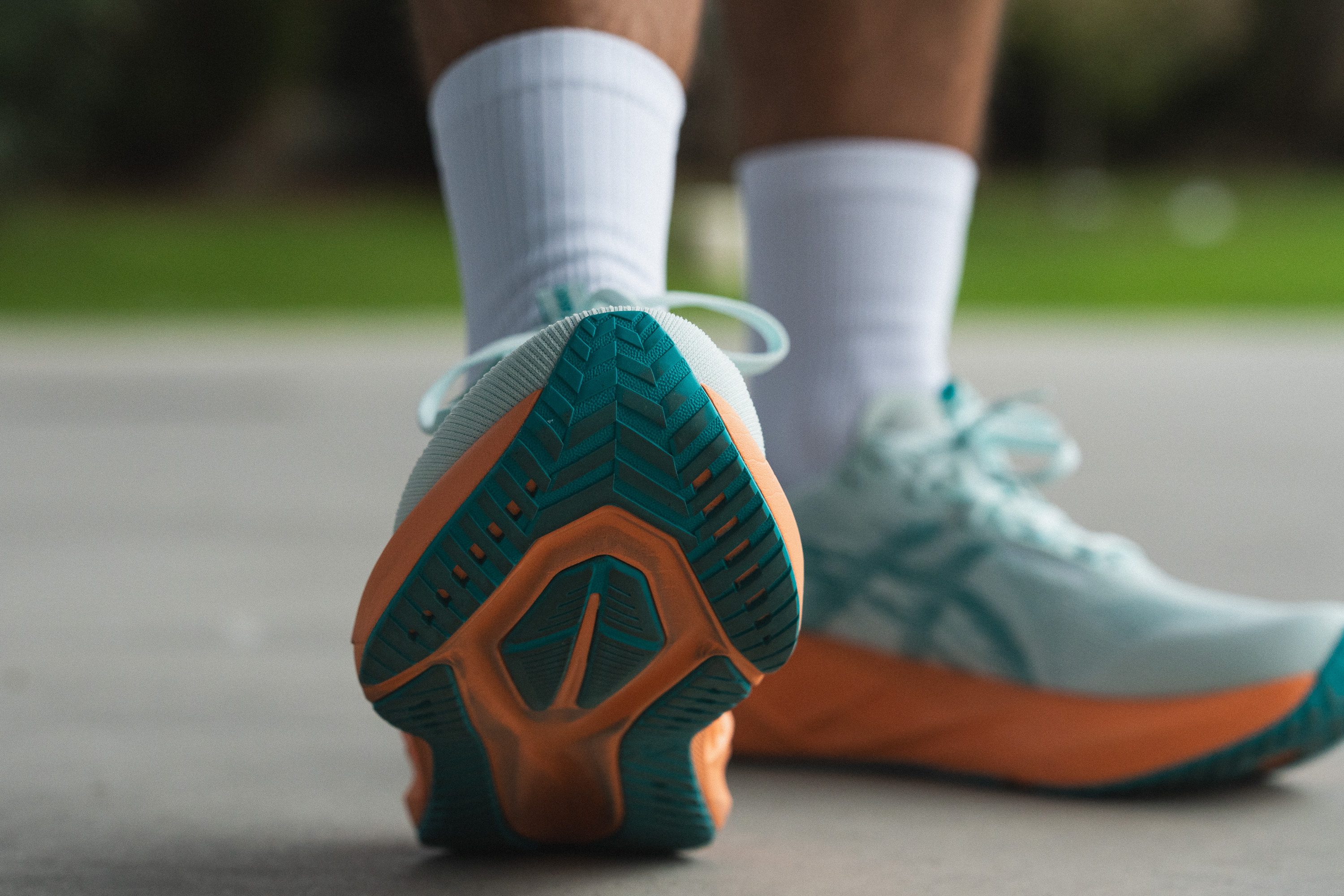
We believe that 3.3 mm is still ample rubber—ASICS could easily reduce it further to 2.7 or 2.8 mm for additional weight savings, and we anticipate this change might come in version 6. For now, we believe other brands aren't challenging the Novablast enough to force ASICS to take that step.
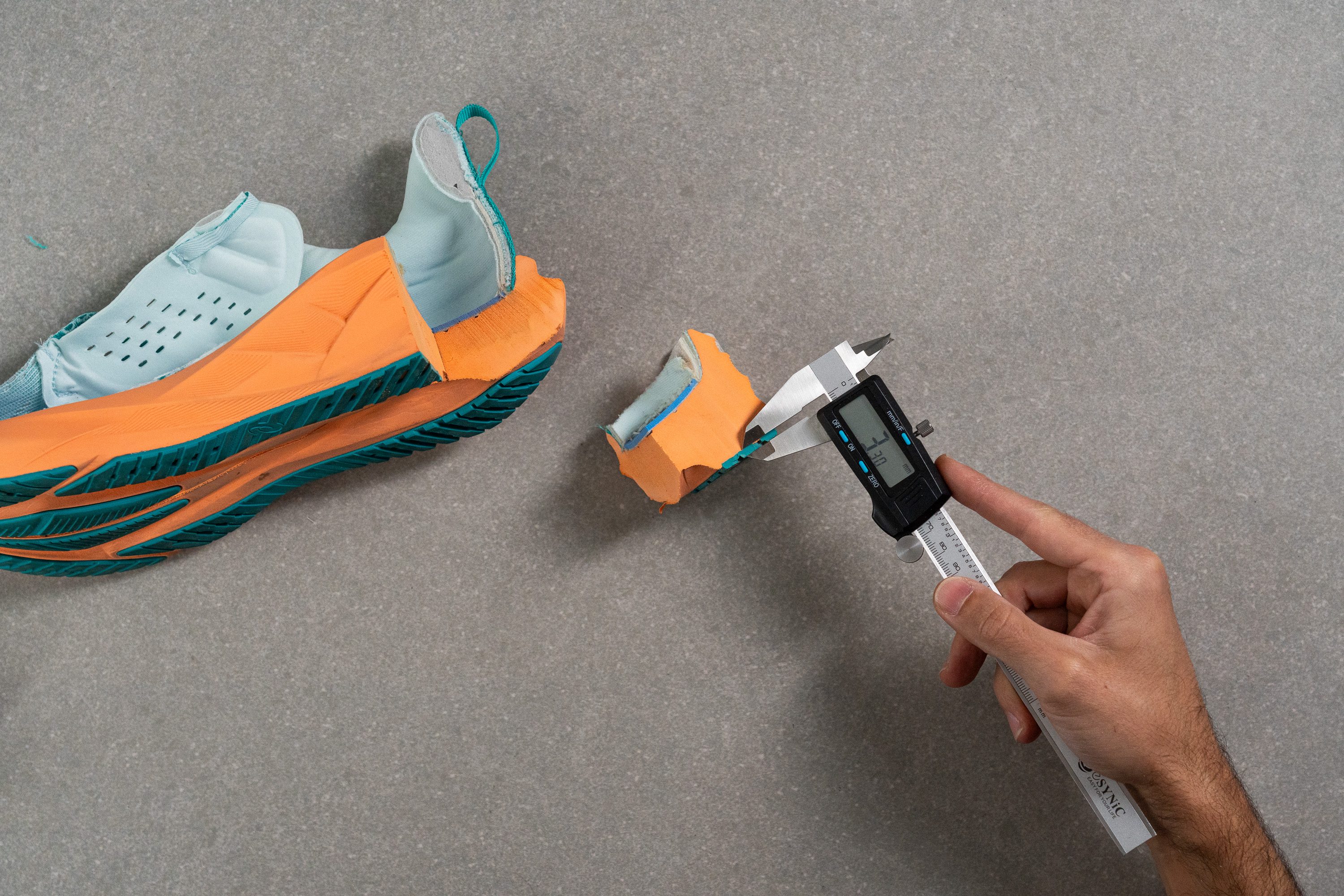
| Novablast 5 | 3.3 mm |
| Average | 3.2 mm |
Misc
Insole thickness
We encountered a fairly standard EVA insole with a thickness of 4.4 mm.
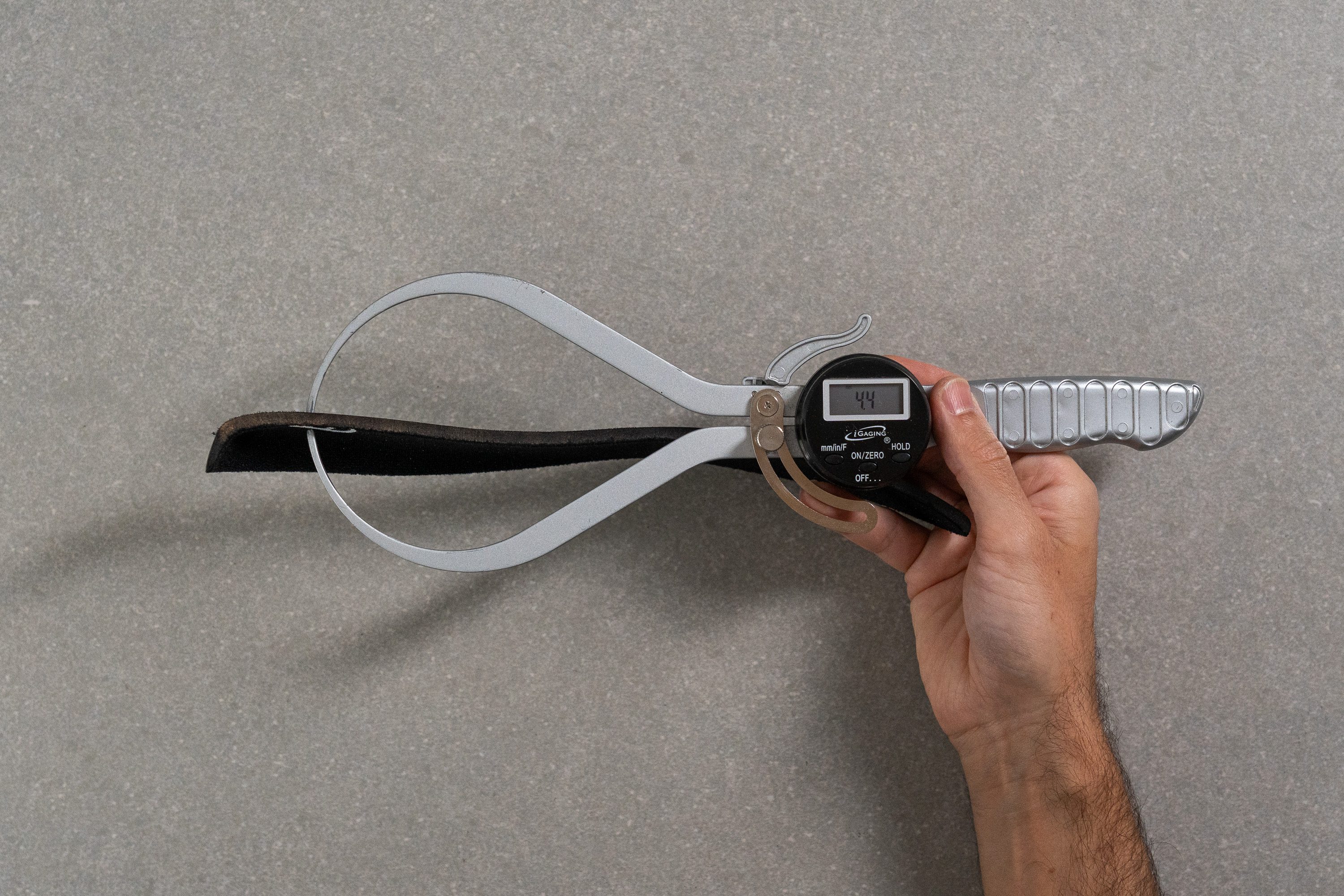
| Novablast 5 | 4.4 mm |
| Average | 4.5 mm |
Removable insole
You can easily replace the removable insole of the Novablast 5 with custom orthotics or a footbed from another model that better suits your preferences.
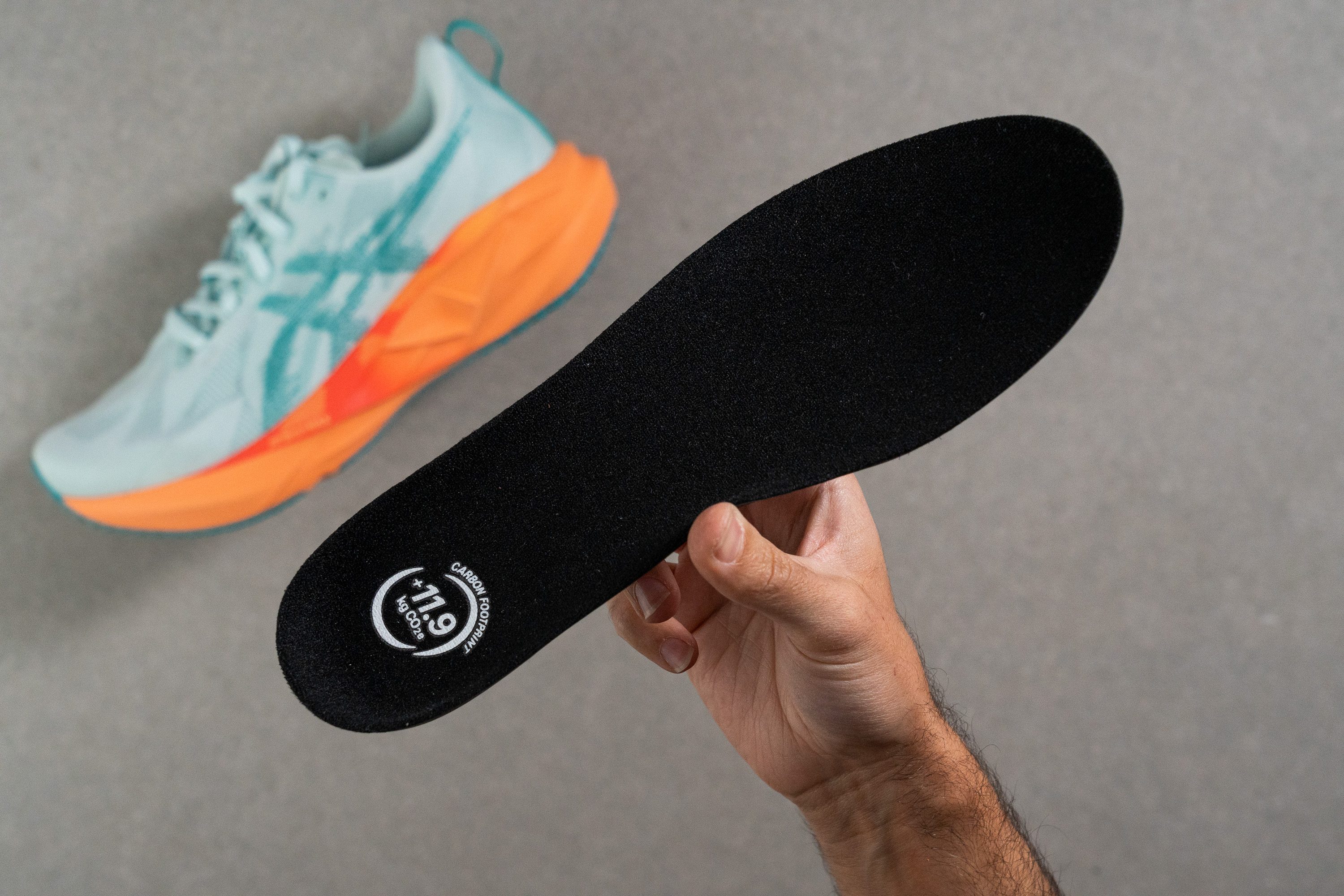
| Novablast 5 | Yes |
Midsole softness in cold (%)
ASICS introduced FF Blast MAX as an enhanced foam in several ways, but its performance in cold weather leaves much to be desired. We found it became a teeth-grinding 42.3% firmer after just 20 minutes in the freezer!
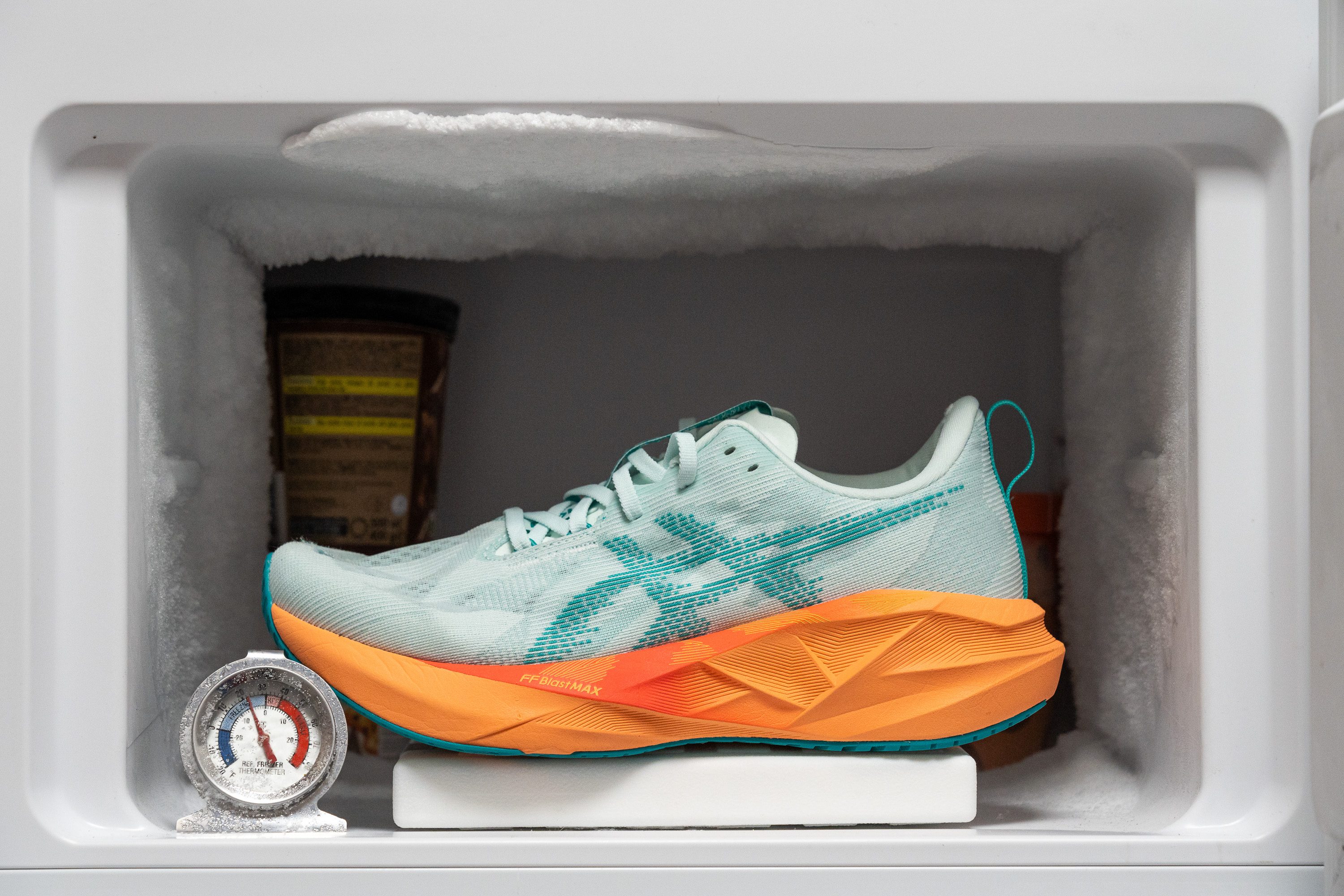
| Novablast 5 | 42% |
| Average | 24% |
Reflective elements
We found reflective elements on the Novablast 5, enhancing visibility and adding a layer of safety for nighttime runs.
| Novablast 5 | Yes |
Tongue padding
ASICS continues to refine the tongue design of the Novablast series, and the 5th iteration showcases their kaizen approach to improving weight while maintaining comfort. We measured 5.0 mm of padding in a focused area of the tongue—precisely where the laces are meant to tie—ensuring cushioning is delivered only where needed most.
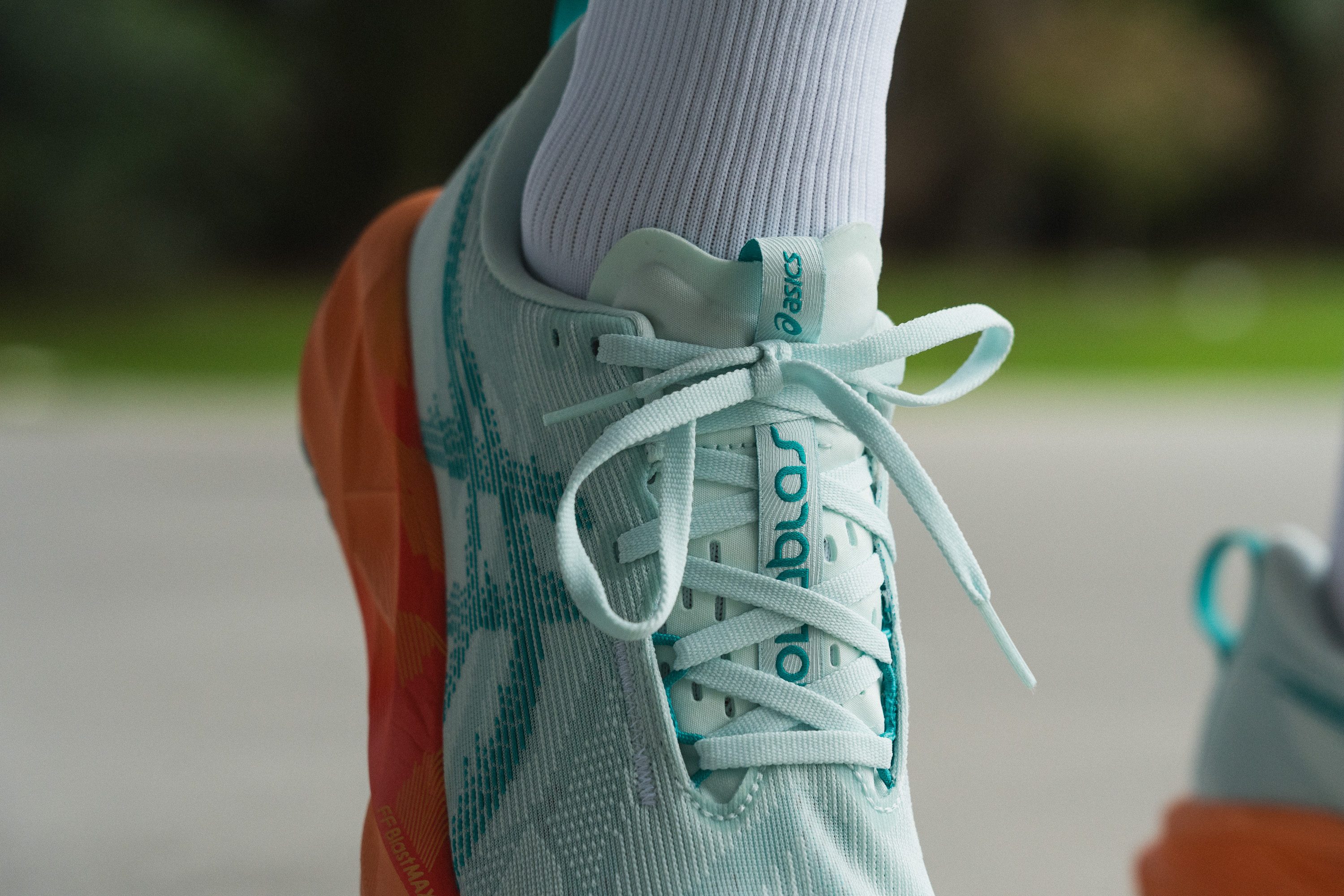
In our view, ASICS could have easily opted for the easy route with a full 5-mm tongue, but we appreciate their effort to minimize weight while enhancing stack height and maintaining comfort. This meticulous approach results in a remarkably lightweight shoe, especially considering its maximalist design.
However, during our runs, we found it crucial to tie the laces exactly over the cushioned section of the tongue. Missing this spot can lead to some lace bite as the rest of the tongue is thin as paper.
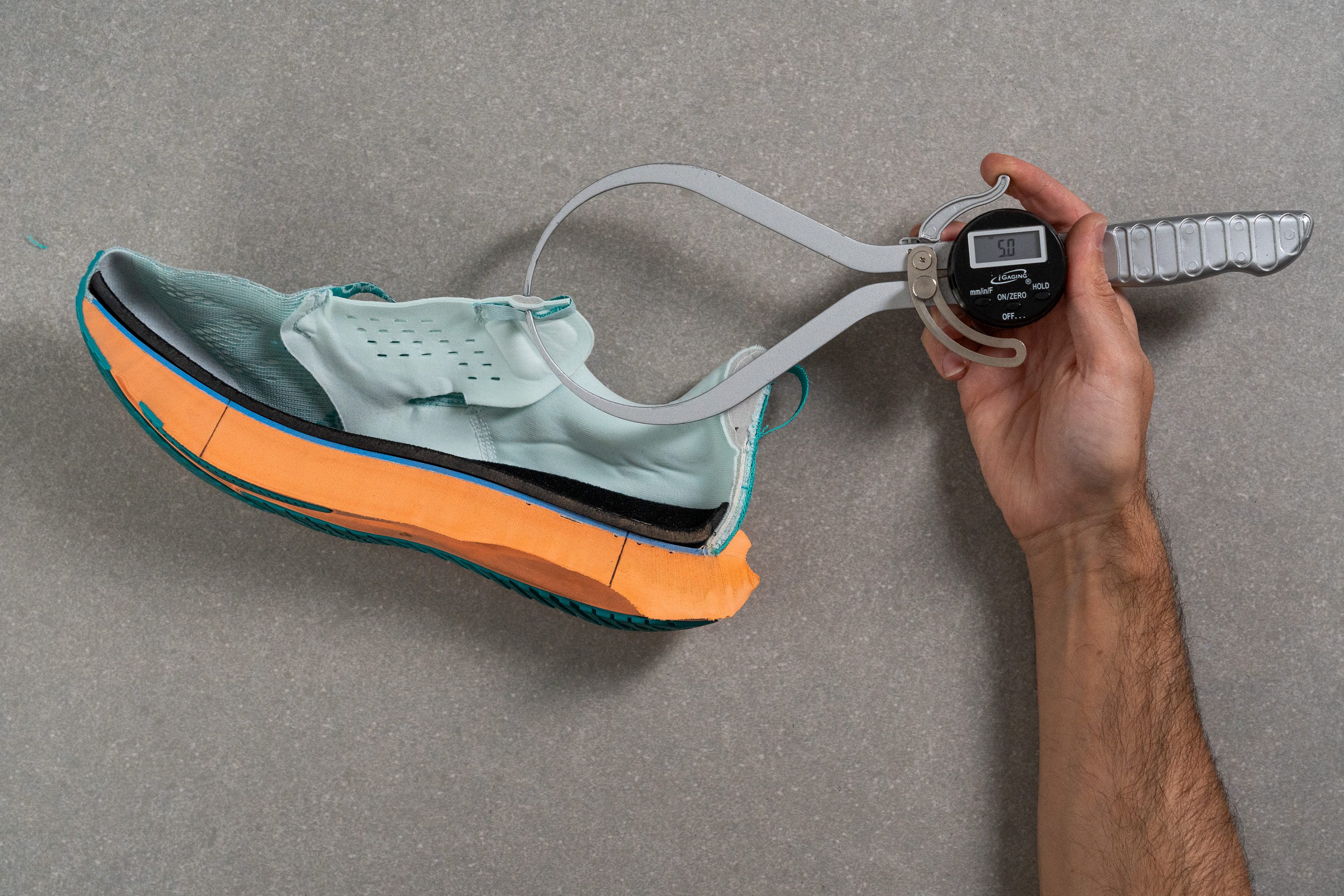
| Novablast 5 | 5.0 mm |
| Average | 5.7 mm |
Tongue: gusset type
The ASICS Novablast 5 keeps its semi-gusseted tongue, which we’re thrilled about, as we keep testing daily trainers like the Brooks Glycerin 21 that lack this feature—something that consistently feels like a missed opportunity.
We believe brands often skip this detail, claiming weight concerns, but ASICS proved otherwise. With a streamlined gusset design like this, attaching it to the sides delivers a significant improvement in fit and comfort, adding only a few grams to the overall weight.

| Novablast 5 | Both sides (semi) |
Price
From our perspective, this is the best-value Novablast yet, featuring the innovative FF Blast Max foam and a better outsole while still the same price. Notably, it's on the same price range of best-sellers like the Ghost and Pegasus series, but delivers far superior underfoot cushioning.
| Novablast 5 | $150 |
| Average | $153 |
Heel tab
ASICS omitted a heel tab in the v1 and v2 but finally introduced it in the LE edition of the Novablast 3, although the regular model still lacked one. Last year, we found it included in every colorway of the Novablast 4, and it seems here to stay—featured in the release collection we purchased for this 5th edition.
It's also among the most durable finger-loop tabs we’ve tested in a long time—we can’t imagine anyone managing to rip this one off.
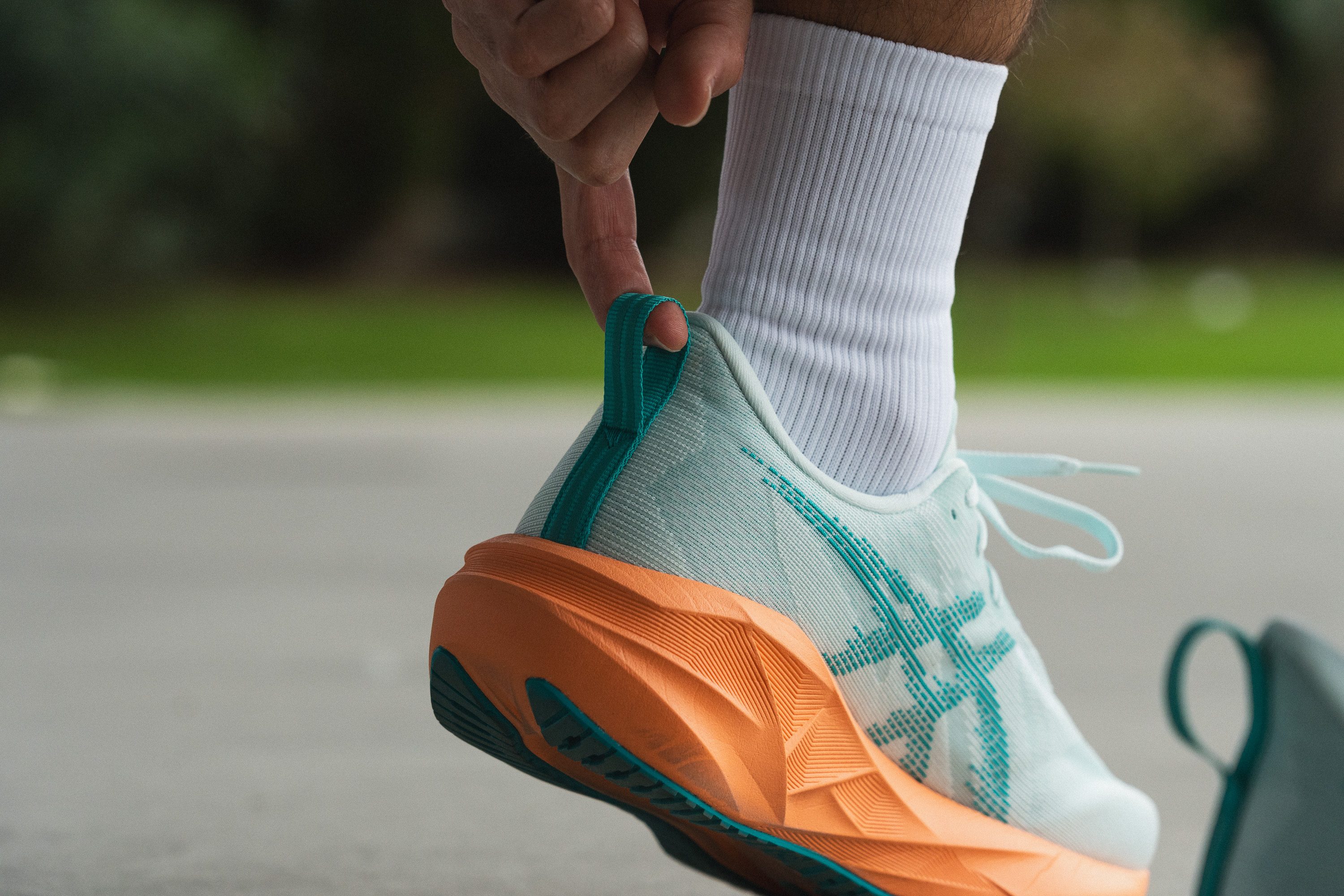
| Novablast 5 | Finger loop |
Tongue tab
Another noticeable design change in this version is the tongue tab.
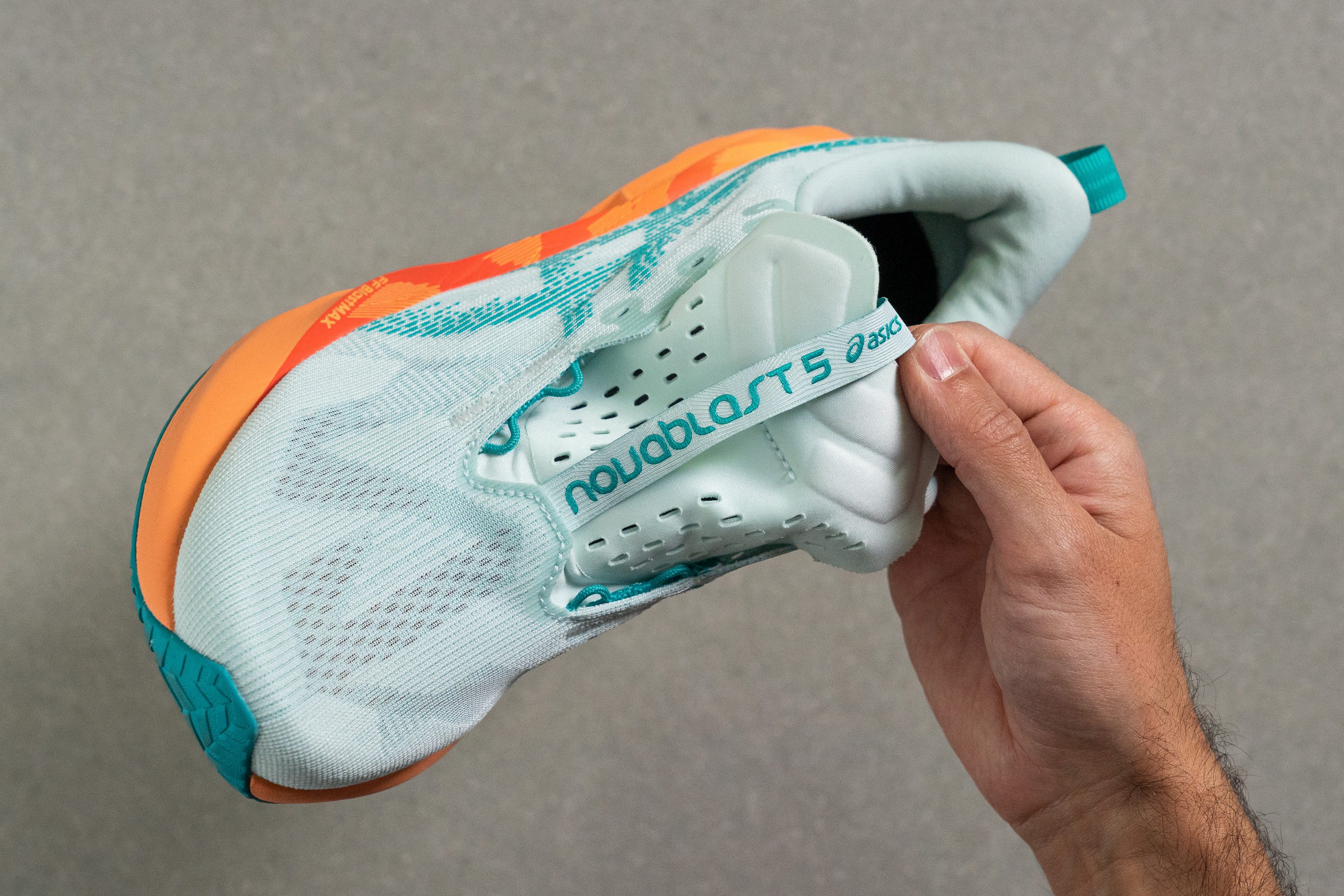
It wraps around the tongue and extends into the toebox, allowing you to pull and adjust the fit before lacing or pass the laces underneath to keep the tongue centered.
